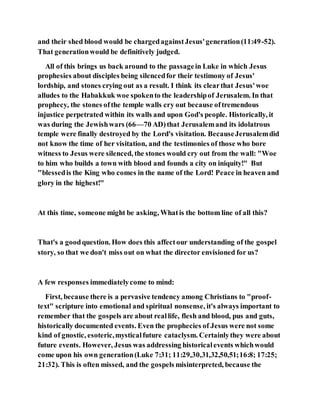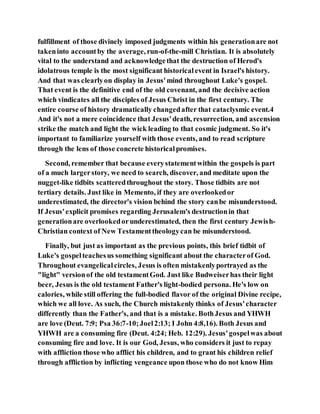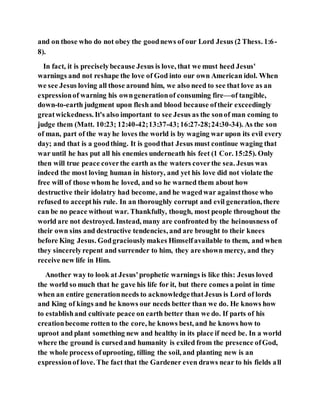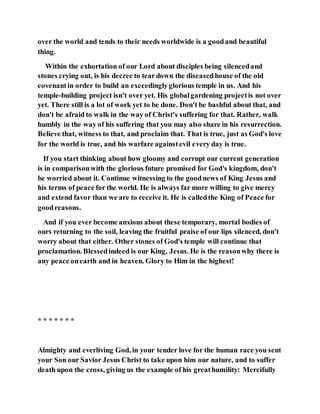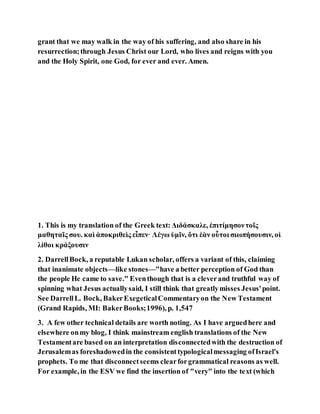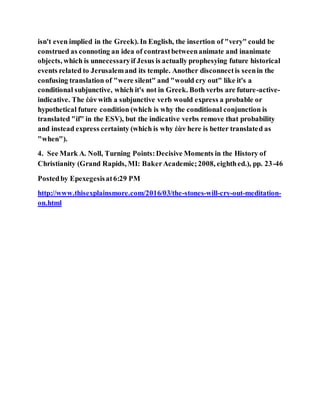The document discusses Jesus' hyperbolical assertion about not silencing his disciples and how various human sentiments, like curiosity, the love of liberty, and religious fervor, should not be suppressed but rather encouraged. It emphasizes the importance of allowing these feelings to be expressed in appropriate ways and highlights God's providence in even the smallest details, using the story of Jesus' entry to Jerusalem as a foundation. Overall, it conveys that God's love and care extend to every aspect of life, urging believers to trust in His guidance and to willingly submit to His needs.
![JESUS WAS EXAGGERATING TO MAKE A POINT
EDITED BY GLENN PEASE
LUKE 19:37-4037 When he came near the place
where the road goes down the Mount of Olives, the
whole crowd of disciplesbegan joyfully to praiseGod
in loud voices for all the miracles they had seen:
38 “Blessedis the king who comes in the name of the
Lord!”[b]
“Peacein heaven and glory in the highest!”
39 Some of the Pharisees in the crowd said to Jesus,
“Teacher, rebuke your disciples!”
40 “I tell you,” he replied, “if they keep quiet, the
stones will cry out.”
BIBLEHUB RESOURCES
SuppressionAnd Expression
Luke 19:39, 40](https://image.slidesharecdn.com/jesuswasexaggeratingtomakeapoint-200812150152/75/Jesus-was-exaggerating-to-make-a-point-1-2048.jpg)
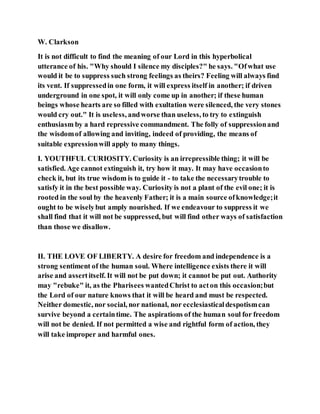
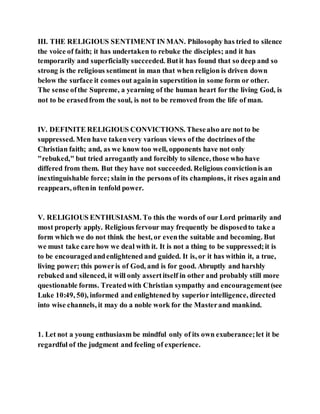
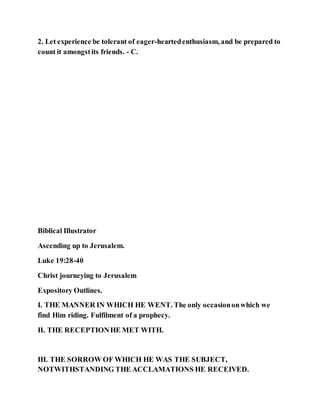
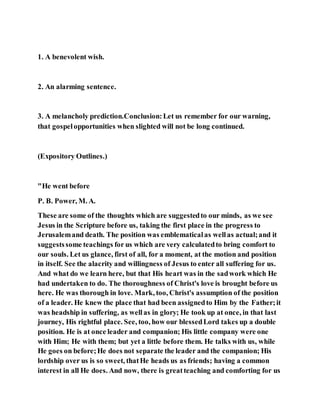
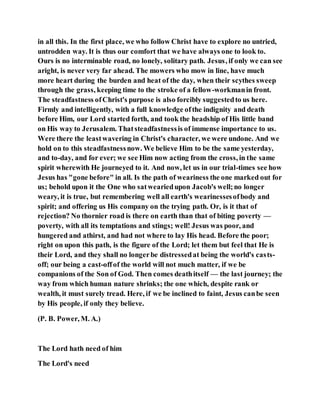
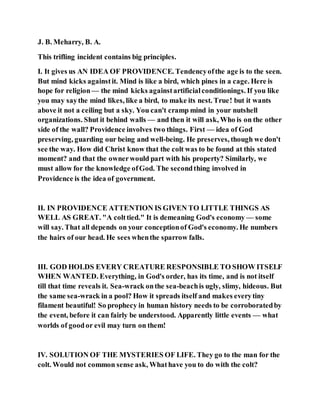
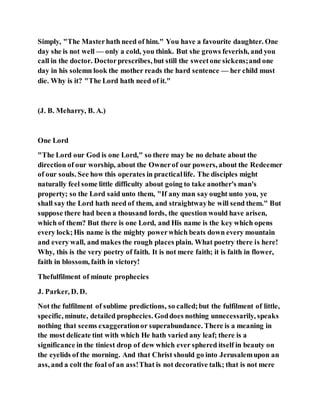
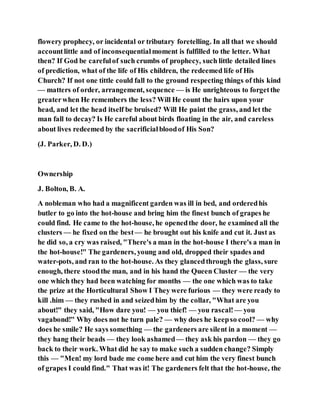
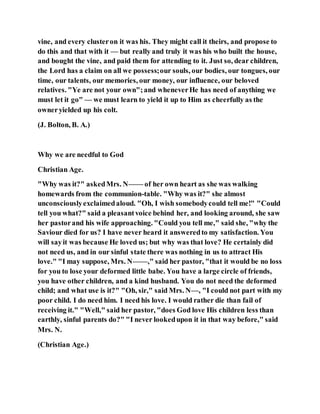
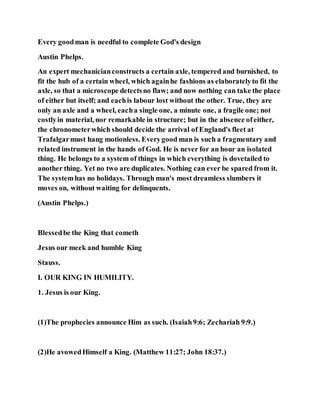
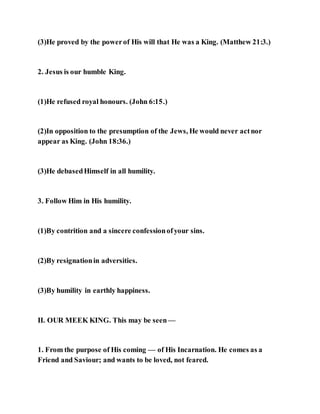
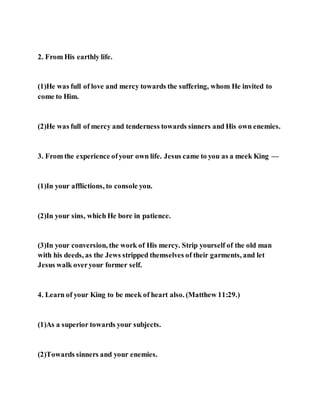
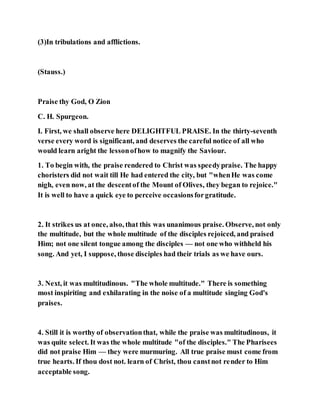
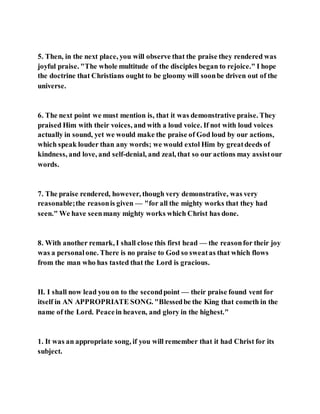
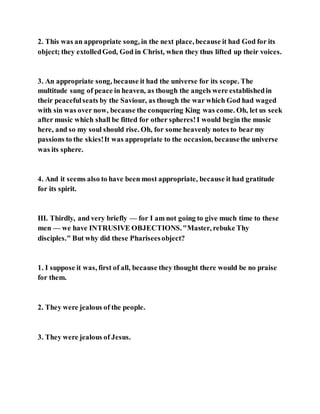
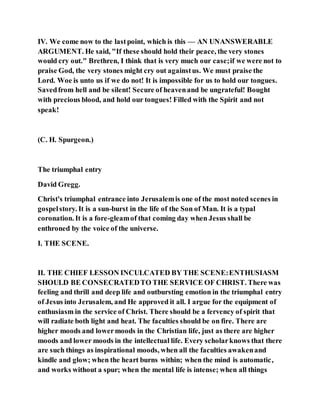
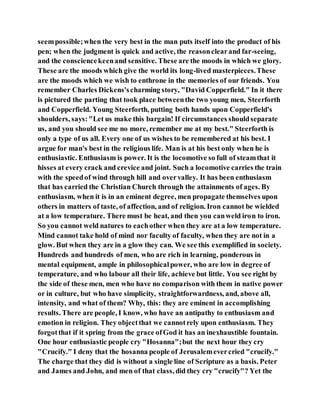
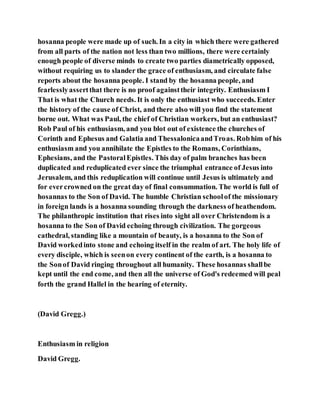
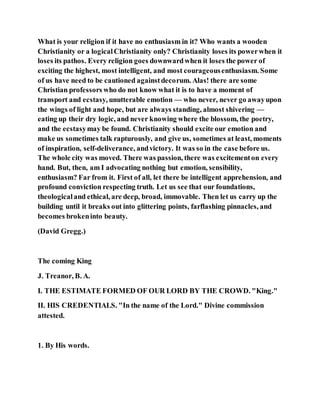
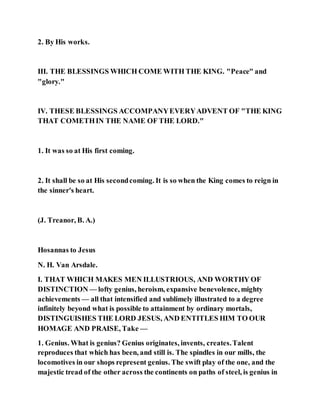
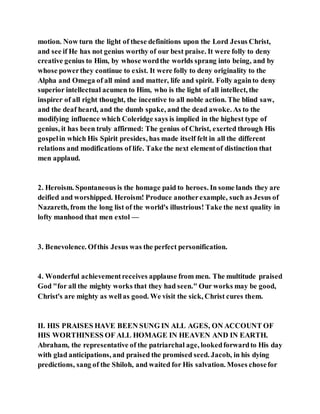
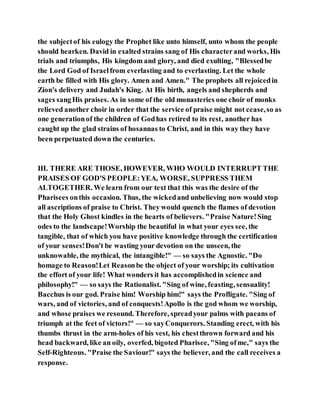
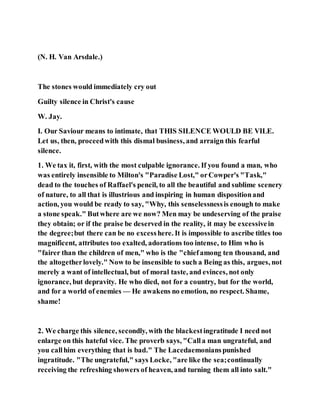
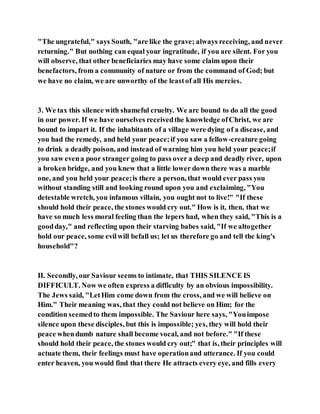
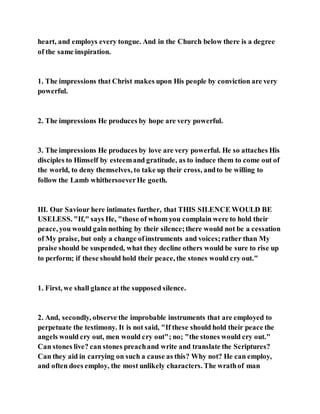
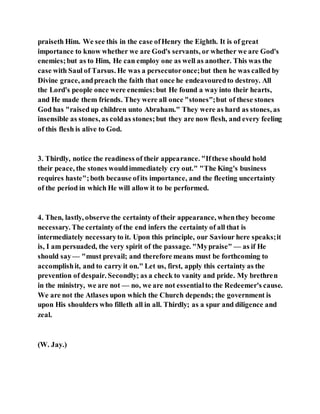
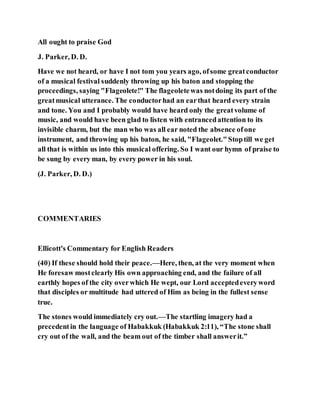
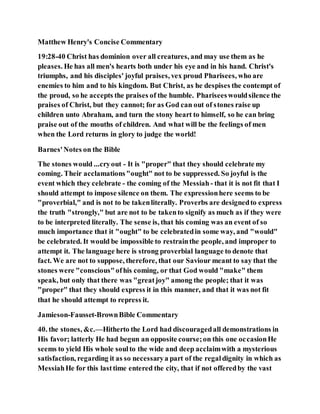
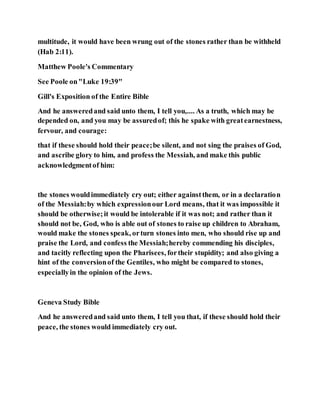
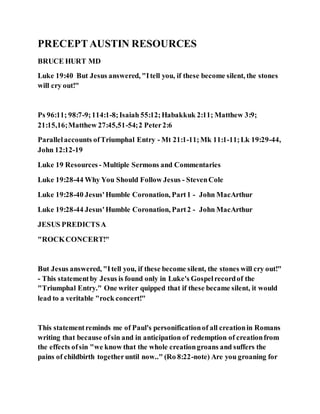
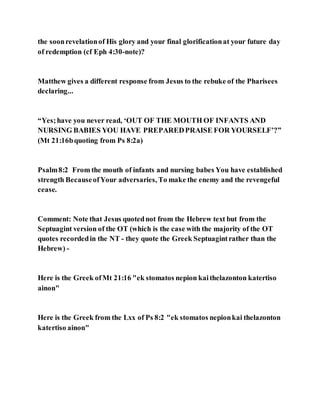
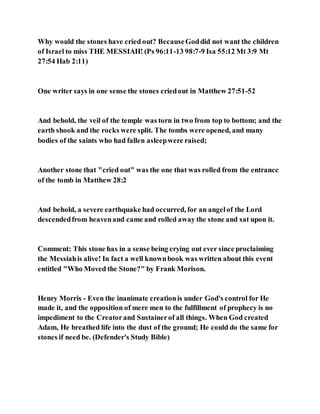
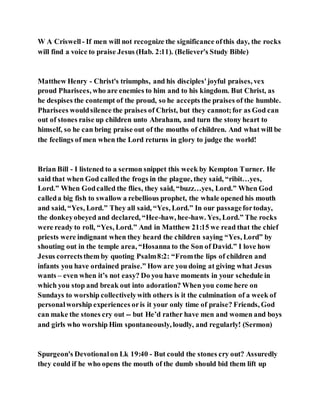
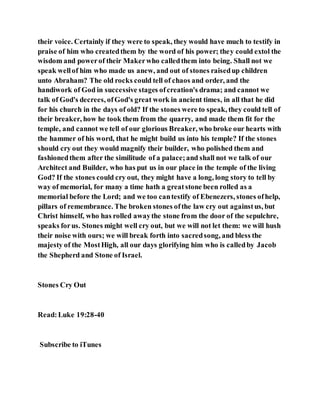
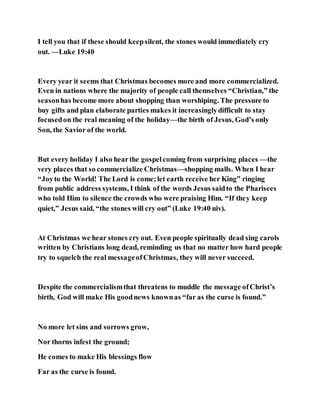
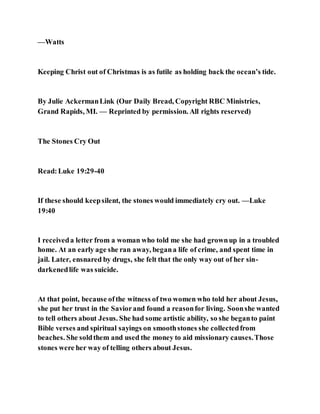
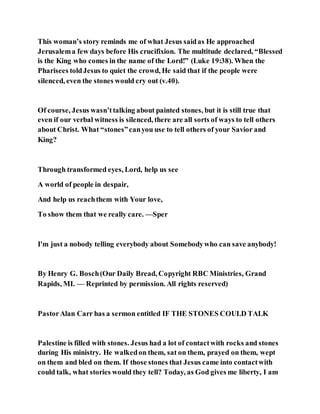
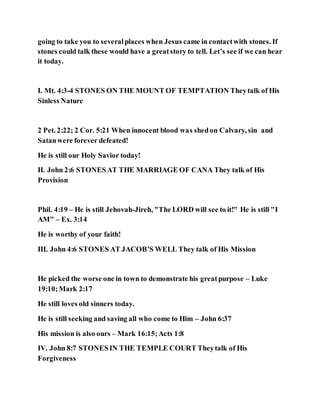
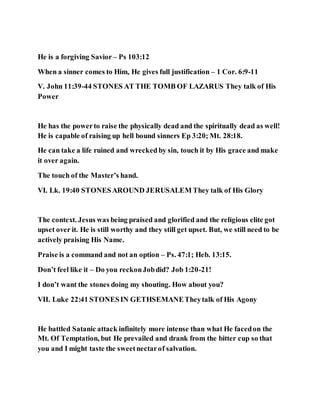
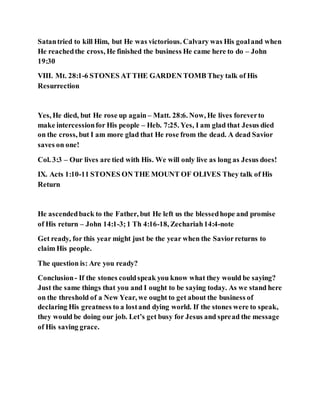
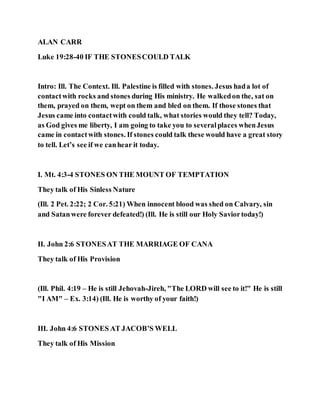
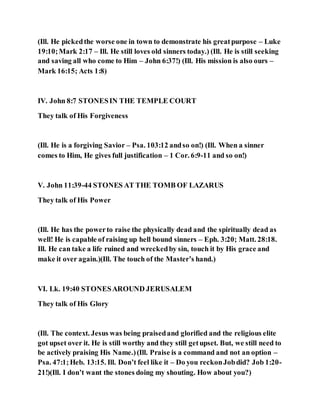
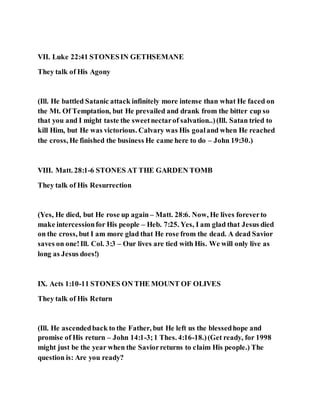
![Conc:If the stones could speak you know what they would be saying? Just the
same things that you and I ought to be saying today. As we stand here on the
threshold of a New Year, we ought to get about the business of declaring His
greatness to a lostand dying world. If the stones were to speak, they would be
doing our job. Let’s get busy for Jesus and spread the messageofHis saving
grace.
THOMAS CONSTABLE
Verse 40
However, Jesus refusedto silence the disciples. They spoke the truth. The
figure of stones crying out (personification) stresses the appropriateness of the
disciples crying out. If the disciples kept silence, the stones would need to
declare who Jesus was insteadof them. This clearmessianic claim is unique to
Luke. It shows the blatant rejectionof Israel"s leaders in the face of
indisputable evidence that Jesus was the Messiah.
"All history had pointed toward this single, spectaculareventwhen the
Messiahpublicly presented Himself to the nation, and God desired that this
fact be acknowledged."[Note:Martin, p253.]
The Triumphal Entry is only the secondincident in Jesus" ministry that all
four evangelists recorded, the first being the feeding of the5 ,000. This
indicates its greatimportance in God"s messianic program.](https://image.slidesharecdn.com/jesuswasexaggeratingtomakeapoint-200812150152/85/Jesus-was-exaggerating-to-make-a-point-45-320.jpg)
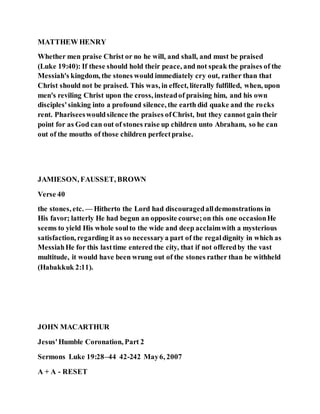
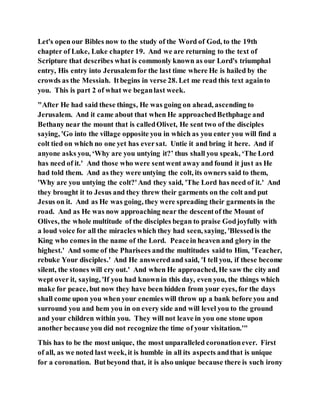
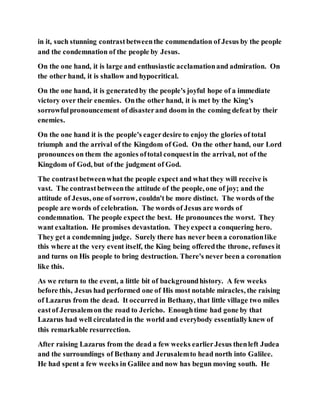
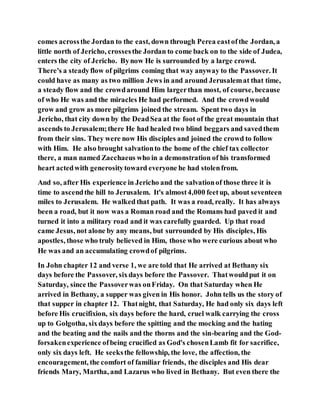
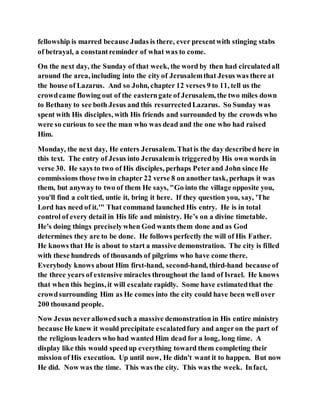
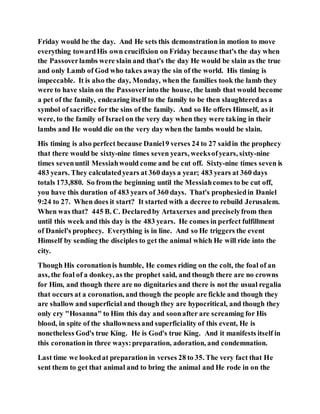
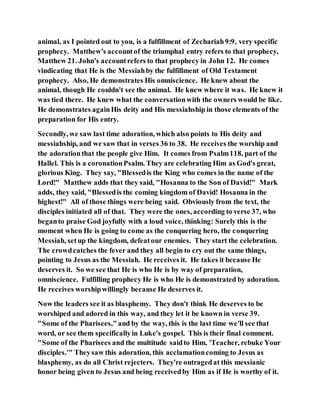
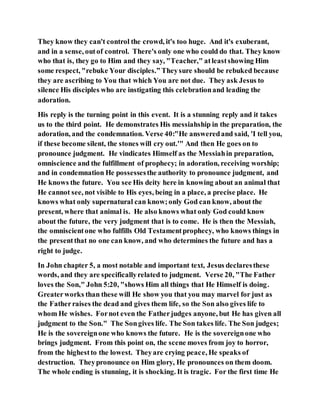
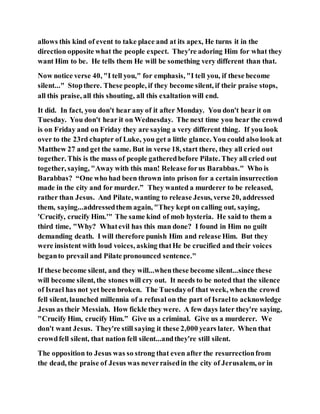
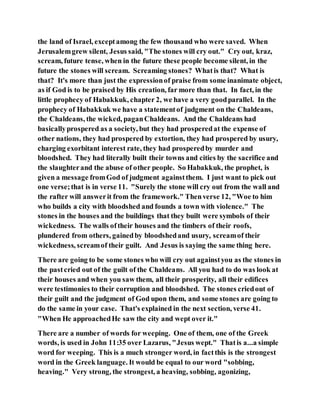
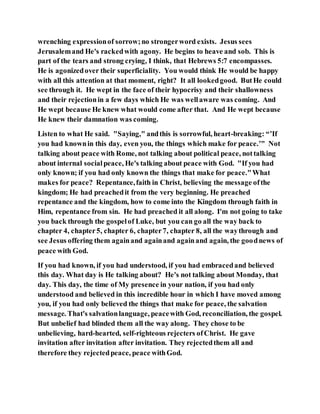
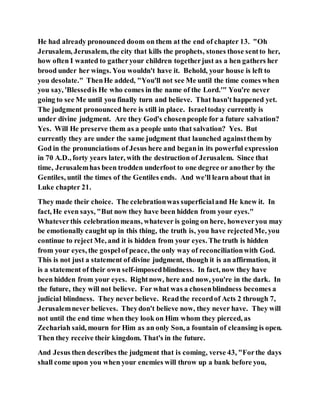
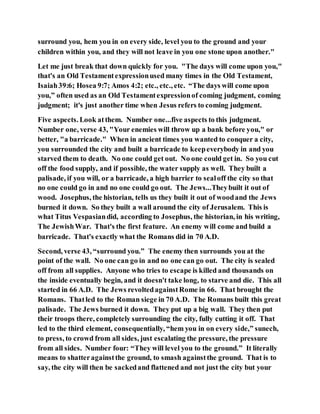
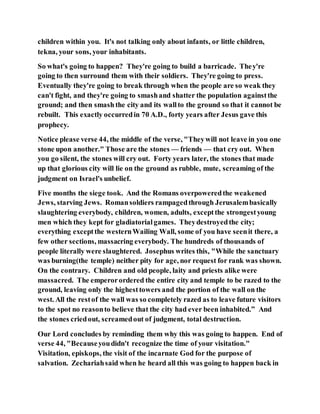
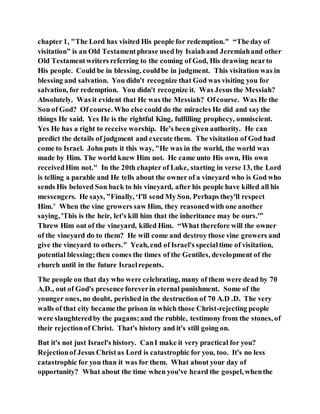
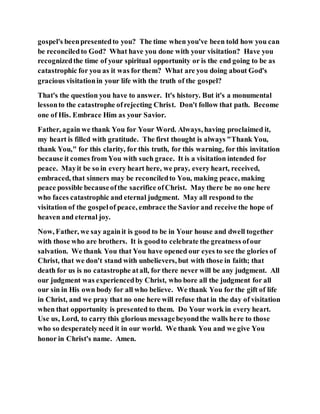
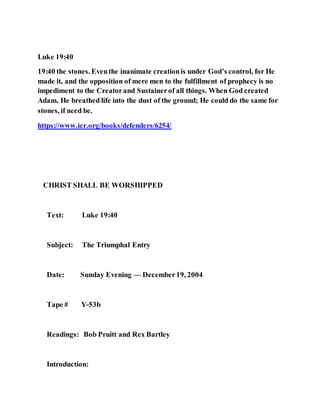
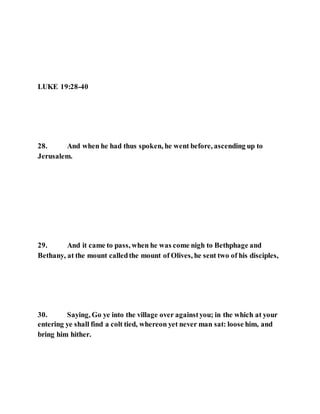
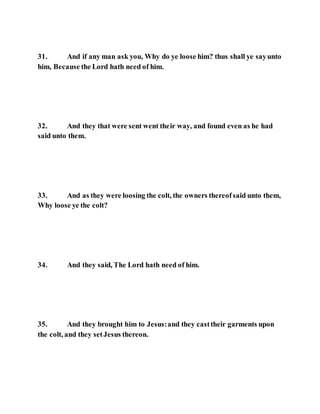
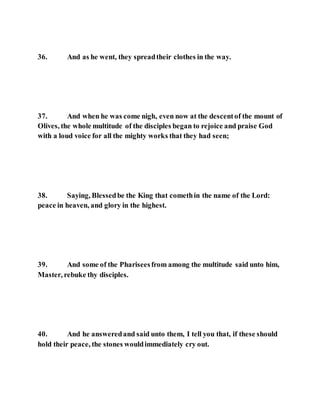
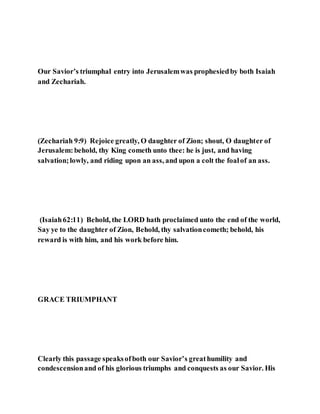
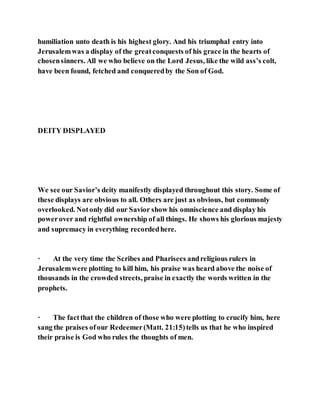
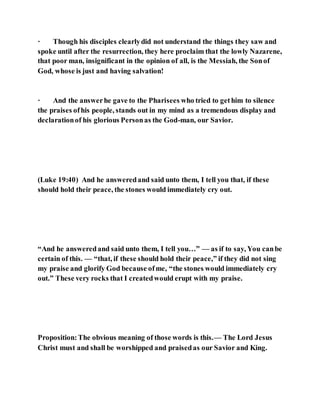
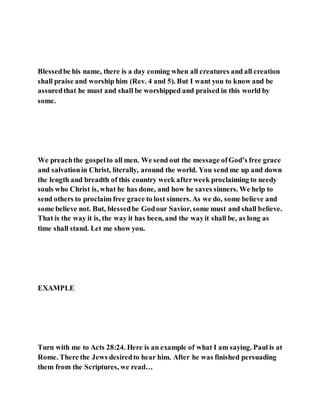
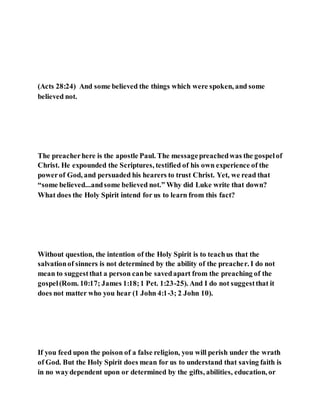
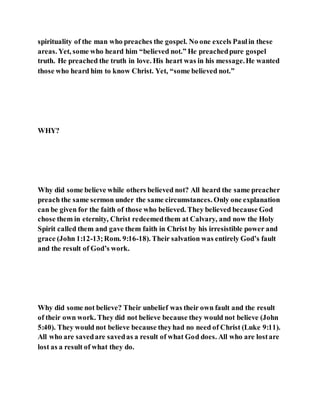
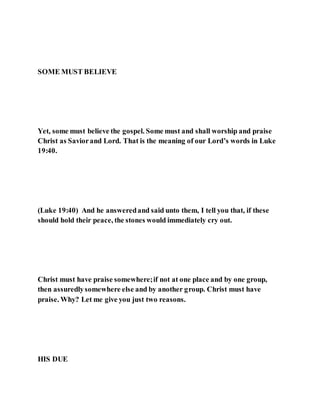
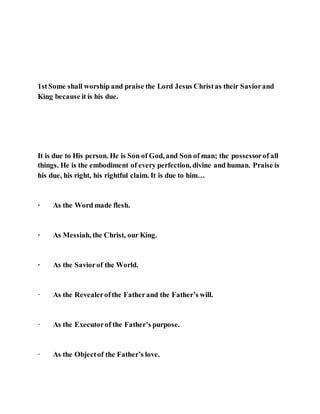
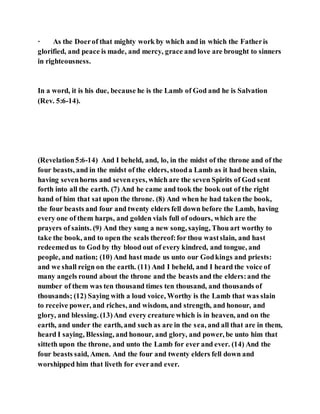
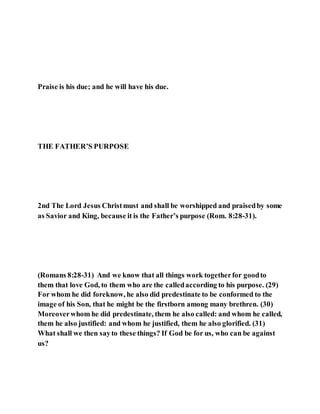
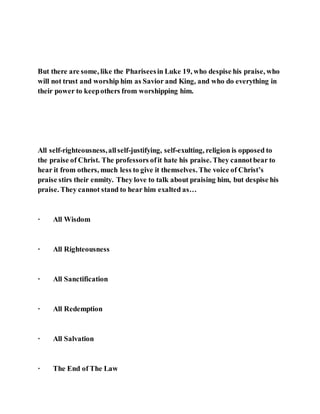
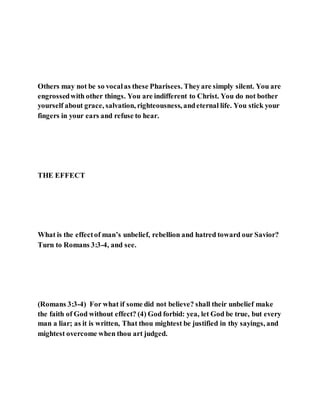
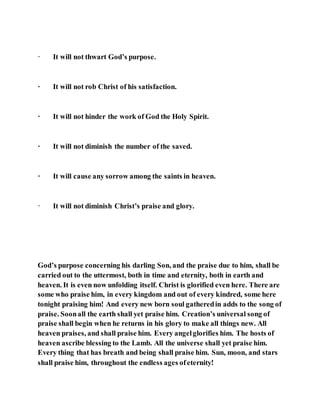

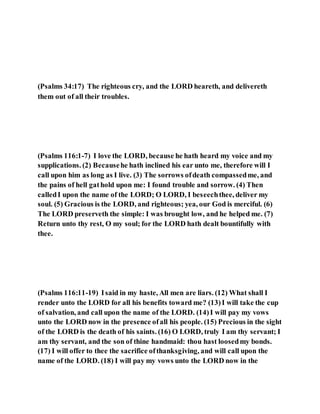
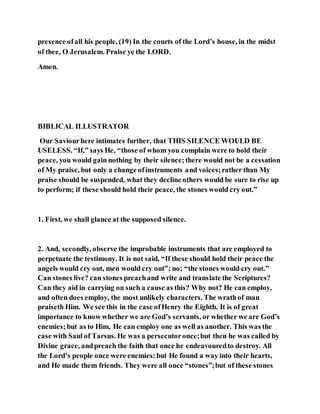
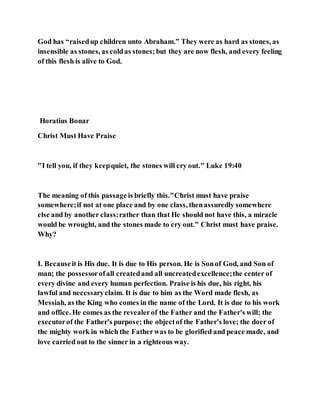
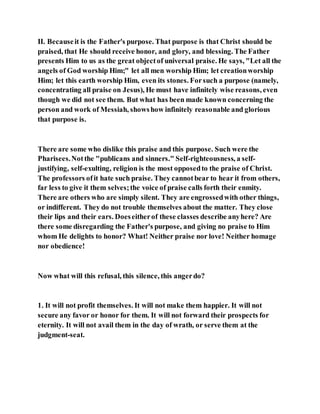
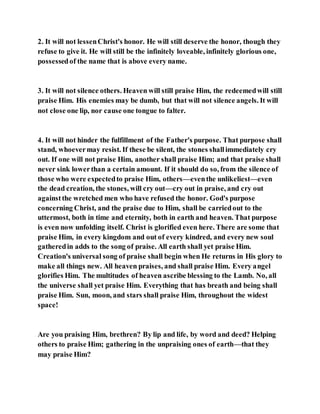
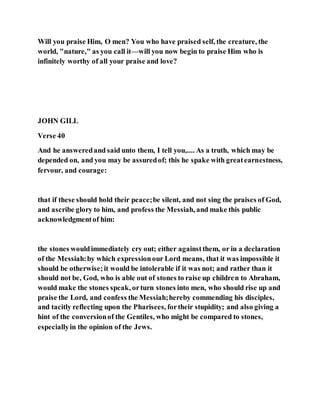
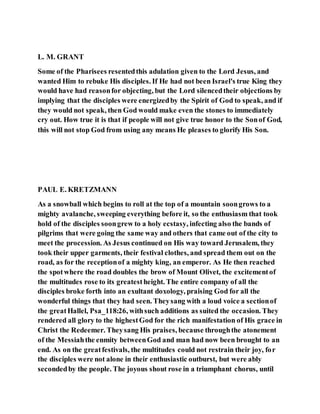
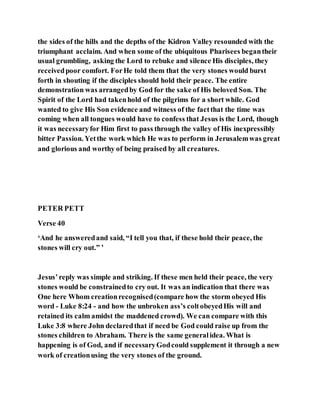
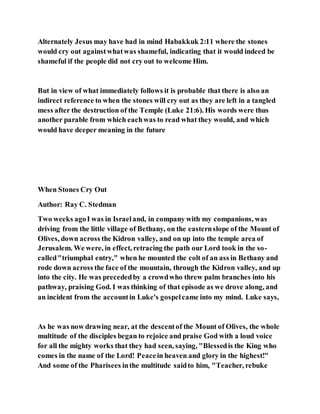
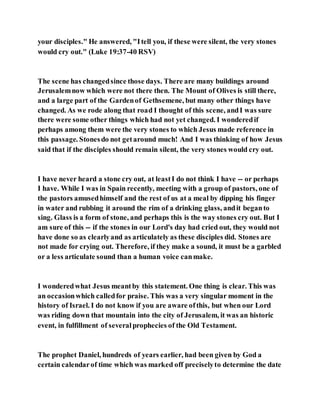
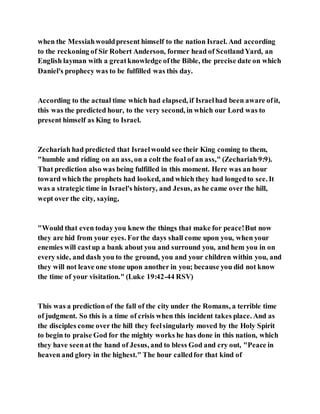
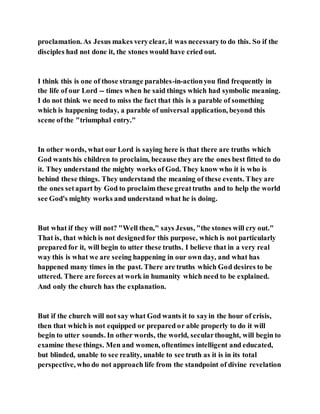
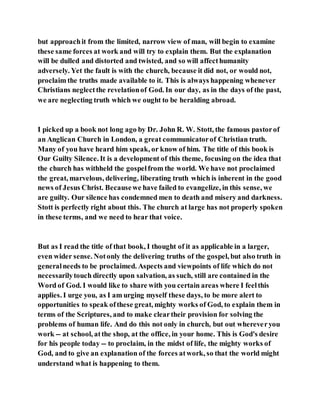
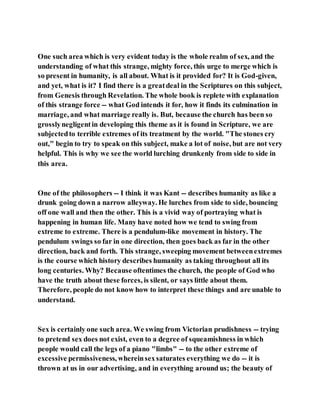
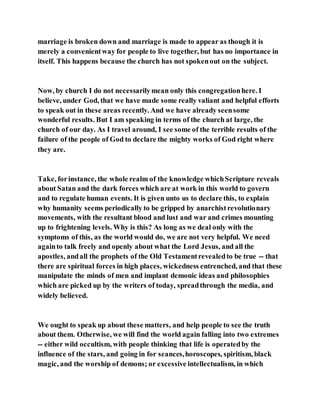
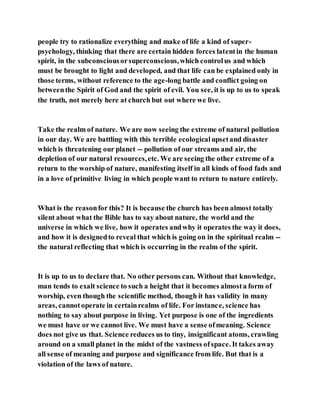
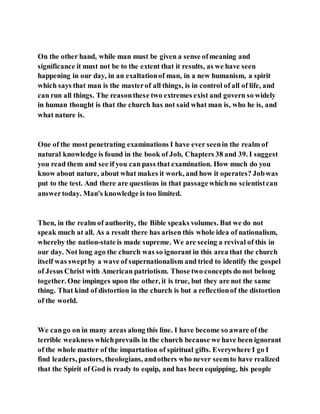
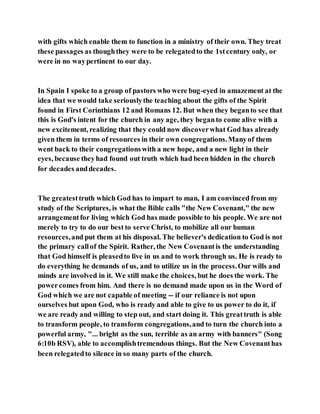
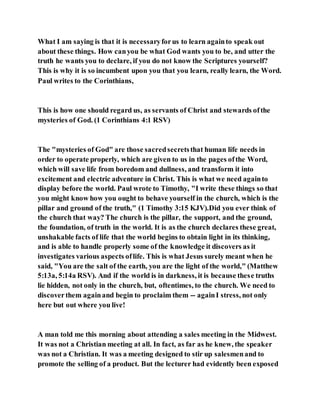
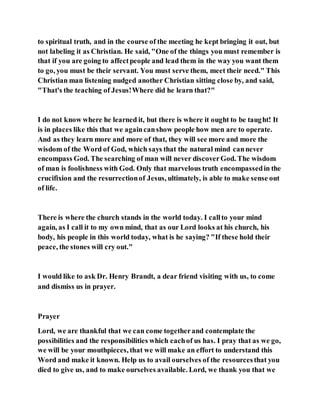
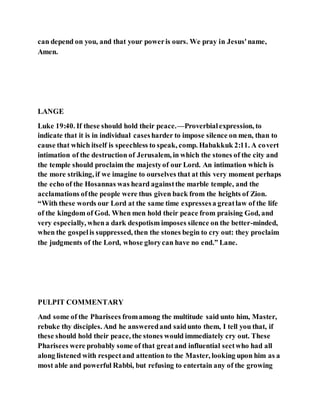
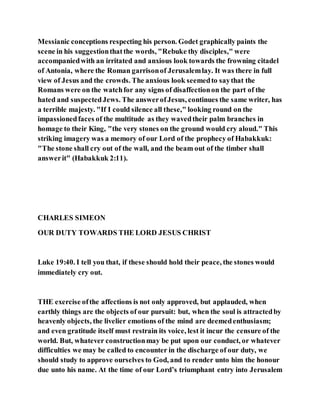
![“the whole multitude of his Disciples beganto rejoice, and to praise God for
all the mighty works that they had seen[Note:ver. 37.].” But, acceptable as
this tribute of praise was to God, it excitedonly envy and indignation in the
breasts of the malignant Pharisees. Theyconsideredthis display of their
gratitude as a just ground for displeasure;and therefore desired our Lord to
silence them; “Master,”saidthey, “rebuke thy Disciples.” OurblessedLord,
however, insteadof rebuking, vindicated his Disciples;and declared, that if,
from any motive whatever, they should be induced to withhold their grateful
acknowledgments, theywould do so to their eternalshame: “I tell you,” &c.
In discoursing on these words, we shall,
I. Shew what obligations we lie under, to magnify and adore the Lord—
The Disciples atthat time had abundant reasonto praise his name—
[They had seenthe miracles he had wrought, and especiallythat of raising
Lazarus from the grave after he had been dead four days [Note: John 12:17-
18.]:perhaps many of them had themselves experiencedhis power to heal.
From what they bad seenand heard, they were assured, that he was the
Messiahso long promised to the world [Note:ver. 38.]: and they regardedhis
advent as the most wonderful expressionof God’s favour toward their whole
nation. Could they then keepsilence? Were they to be blamed for testifying
their love to this augustPersonage, now that they saw him in the very actof
fulfilling one of the most remarkable of all the prophecies [Note:Compare
Zechariah 9:9. with John 12:13-15.]? Whenthey were thus highly privileged
to witness, what “many prophets and kings had in vain wished to see and
hear,” would they not have been guilty of the basestingratitude, if they had
held their peace? If Abraham leaped for joy at a distant prospectof that
period, should not they much rather [Note: John 8:56.]?]](https://image.slidesharecdn.com/jesuswasexaggeratingtomakeapoint-200812150152/85/Jesus-was-exaggerating-to-make-a-point-102-320.jpg)
![But our obligations to praise him are far greaterthan theirs—
[We have a far clearerknowledge ofthe dignity of his person. They viewed
him indeed as “a greatprophet;” and on some occasions theyseemedto have
thought him more than human: but on the whole, they consideredhim as a
mere man, though indeed the greatestofmen. But we know him to be “God
manifest in the flesh,” even “Godover all, blessedfor ever [Note: 1 Timothy
3:16. Romans 9:5. Hebrews 1:3. Colossians2:9.].” And shall we behold in him
such adorable majesty and condescension, andyet withhold from him our
tribute of praise?
We also are far better acquainted with the ends of his mission. The Disciples
supposedthat he was sentto instruct them more fully in the knowledge of
God’s will, to deliver them from the Roman yoke, and to make them a
prosperous and happy people. But we know that he came to deliver us from
the yoke of sin and Satan, to reconcile us to God by the death of his cross, to
teachus, not by his word only, but by his Spirit, and finally, to save us with an
everlasting salvation. Are not we then bound to bless and adore his name?
Moreover, we have a far deeper insight into the extent of his benefits. If the
Disciples had seentheir nation raised to universal empire, and enjoying
uninterrupted peace and prosperity, they would have been wellsatisfied, and
would have lookedfor nothing beyond it, especiallyif they themselves were
exalted to the highestoffices of dignity and power. But we look for infinitely
richer benefits at his hands. We expectthe pardon of sin, and peace with God,
and victory over our spiritual enemies, and “a kingdom that cannot be
moved.” Shall we then refuse to praise him? “If we should hold our peace, will
not the very stones cry out againstus?”]](https://image.slidesharecdn.com/jesuswasexaggeratingtomakeapoint-200812150152/85/Jesus-was-exaggerating-to-make-a-point-103-320.jpg)
![This being clear, we shall proceed to,
II. Enforce our duty from some additional considerations—
That we may be excitedto rend the air with our acclamations and hosannas,
let us consider,
1. How delightful a duty this is!
[It is justly observedby the Psalmist, that it is not only “a good,” but also “a
pleasantthing to be thankful.” Who can doubt which were the happier, the
disciples who shouted forth the praises of their Lord, or the Pharisees, who,
with malignant jealousy, strove to silence them? Indeed, a devout and grateful
spirit is a foretaste of heavenitself; and, as far as relates to the outward
exercise oftheir affection, the Disciples onthat occasionstronglyresembled
the heavenly hosts:they all were penetrated with fervent love to the same
divine object, and exerted all their powers to magnify his name. Let us then,
eachin his place and station, be followers of them; and our happiness shall
surely rise with our employment.]
2. How reasonable a duty it is!
[The Pharisees,if they had been askedthe reasonof their conduct, would
doubtless have offered many specious arguments in vindication of themselves.
They might have imputed the conduct of the Disciples to enthusiasm,
ostentation, hypocrisy. They might have blamed Jesus for suffering them to
raise such a tumult, and to endanger thereby the peace of the whole city. They
might have ascribedhis acquiescence to vain-glory, and a love of popularity,](https://image.slidesharecdn.com/jesuswasexaggeratingtomakeapoint-200812150152/85/Jesus-was-exaggerating-to-make-a-point-104-320.jpg)
![which did but ill accordwith his pretensions to superior wisdom and humility.
This would have appeared very satisfactory in their eyes;and they, like our
modern Pharisees,wouldhave arrogatedto themselves the exclusive name of
rational Christians. But we know on whose side reasonwas in the instance
before us: and as long as infinite greatness,and unbounded goodness, deserve
our admiration, so long will it be reasonable to bless and magnify our
adorable Jesus with all our might.]
3. How necessarya duty it is!
[The Pharisees thoughtthat, if Jesus merited any respectat all, his Disciples
should have regardedhim only with silent reverence, insteadof attracting so
much attention by their clamorous proceedings. Butour Lord told them, that
silent reverence, howevergreat, was not sufficient; that they were bound to
give a public testimony of their affection;and that, if they withheld it, they
would be traitors to his cause. Thoughtherefore we be not calledto bear our
testimony precisely in the same way, yet are we all bound to confess Christ
before men [Note: Matthew 10:32-33.], and to let it be seen, “Whosewe are,
and whom we serve.”
Shall it be said, That there is no such occasionnow for our public
acknowledgementsas there was then; we answer, Thatthe world needs as
much as everto have their attention drawn to the Lord Jesus, and to be
stimulated to love and serve him. And, if this were not the case, stillit would
be our duty to confess him openly, since in heaven, where he is universally
known, he is universally and incessantlyadored.]
Address [Note:If this be the subject of a Commemoration Sermon, the
particular blessings that are commemoratedshould be opened in this place,
and the audience be exhorted, in their carnal feasting, not to be unmindful of](https://image.slidesharecdn.com/jesuswasexaggeratingtomakeapoint-200812150152/85/Jesus-was-exaggerating-to-make-a-point-105-320.jpg)
![that spiritual joy which the occasiondemands. In this case,the following
address might be omitted.]—
1. Those who, like the Pharisees,have no heart to adore the Lord—
[It is not difficult to determine who would have taken part with the Disciples,
and who with the Pharisees. We needonly ask, Whatis our conduct now? Are
we frequently and fervently engagedin the secretexercisesofthe closet, and
are we bold in confessing Christbefore an ungodly world? Or are we formal
in secretduties, and ready to blame the superior zeal of others? If we be of
this latter class, we should surely have joined the Pharisees in their opposition
to the Disciples. To suchthen we say, Deceive notyourselves with vain
excuses:nor think to justify yourselves by condemning others. Suppose for a
moment that the Disciples, in their zeal, had exceededthe strict bounds of
prudence and propriety: was that any reasonwhy the Pharisees shouldrender
him no praise at all? Was less due from them, because others paid too much?
Yea rather, was not their pretended zeal for propriety, a mere cloak for their
own envy or indifference? Away then with such base dispositions as they
manifested; and, instead of blaming the zeal of others, endeavour to “glorify
Christ with your body and your spirit which are his [Note: 1 Corinthians
6:20.].” Far be it from us to countenance excess:but in this lukewarm age, we
are far more in danger of erring from defect. This, at least, is your danger,
whilst, with all your jealousyabout being “righteous over-much,” you have no
fears lest you should not be found “righteous enough.” To you therefore, in
the name, and by the command, of Christ himself, we say, “Be zealous and
repent [Note:Revelation3:19.].”]
2. Those who, like the Disciples, feeltheir hearts warmed with love to Christ—](https://image.slidesharecdn.com/jesuswasexaggeratingtomakeapoint-200812150152/85/Jesus-was-exaggerating-to-make-a-point-106-320.jpg)
![[You must expect to meet with opposition from the world, and especiallyfrom
proud, envious, malignant Pharisees. Butlet not the fearof their censures
deter you from the path of duty [Note:Hebrews 13:13.]. If Jesus have given
up his life for you, it is a small matter for you to give up your names for him:
and if you will not bear so light a cross as that of being calledby some
opprobrious name for him, you have little reasonto number yourselves
among his true disciples [Note: Matthew 10:38.]. It will be proper indeed for
you to considertimes and places, and sometimes to lay a restraint on your
feelings, Jestby an unseasonable disclosureofthem, you “castyour pearls
before swine, that will only turn and rend you [Note: Matthew 7:6.].” But let
not the fear of man be the restraining principle: rather, let the love of Christ
be the one motive for moderating, as wellas for exhibiting, the proofs of your
love. Then shall you in due seasonhave a public testimony of his approbation,
when those who now condemn you shall be themselves condemned.]
Pulpit
Volume 12 1
1
PRAISE YOUR GOD, O ZION
NO. 678
A SERMON
DELIVERED ON SUNDAY MORNING, FEBRUARY25, 1866,
BY C. H. SPURGEON,
AT THE METROPOLITAN TABERNACLE,NEWINGTON.
“And when he was come nigh, even now at the descentof the mount of Olives,
the whole multitude of the](https://image.slidesharecdn.com/jesuswasexaggeratingtomakeapoint-200812150152/85/Jesus-was-exaggerating-to-make-a-point-107-320.jpg)
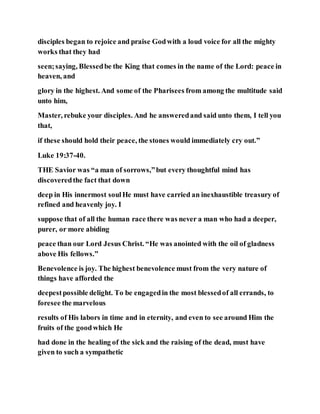
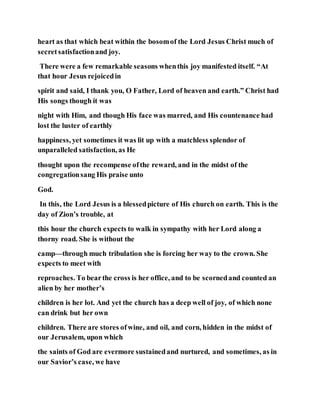
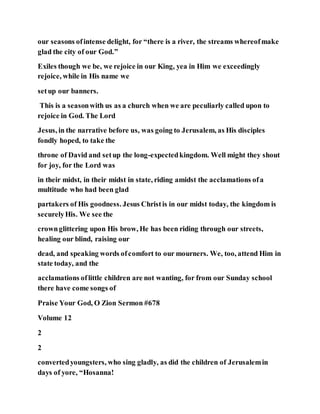
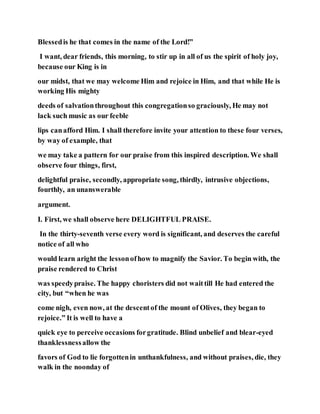
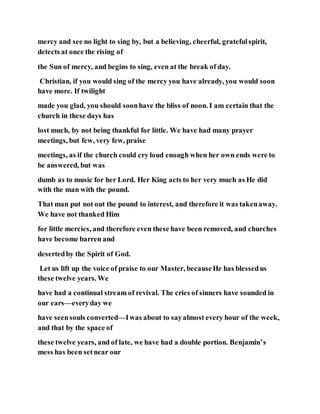
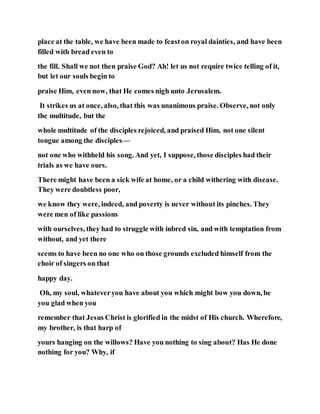
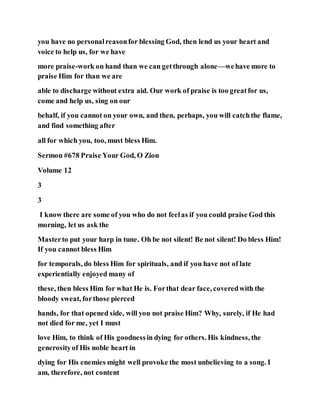
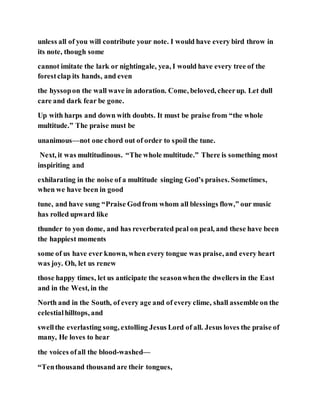
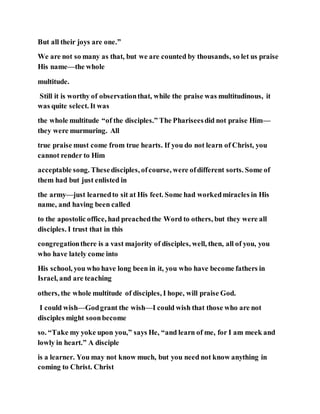
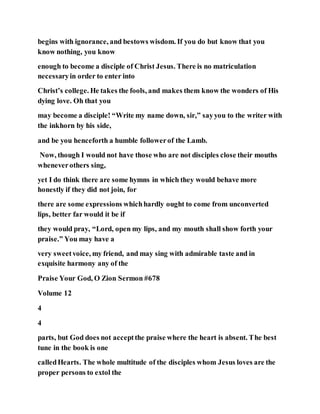
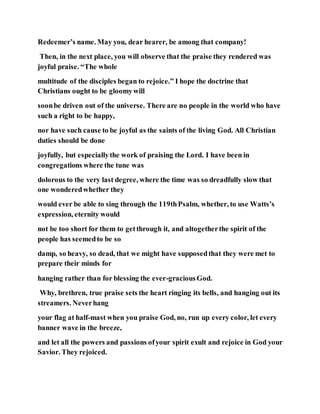
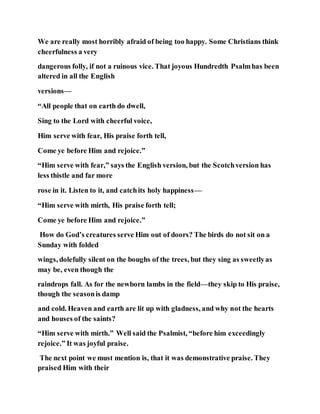
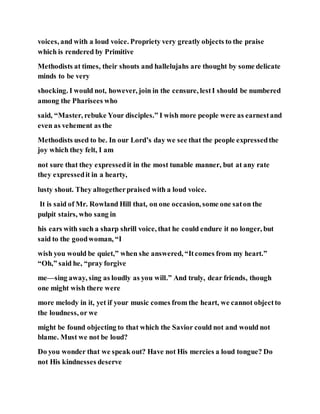
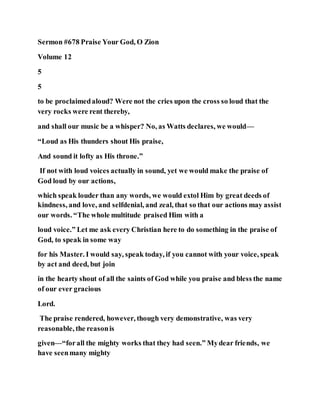
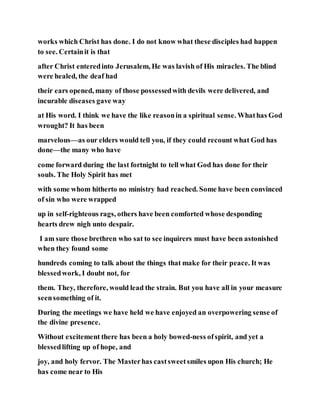
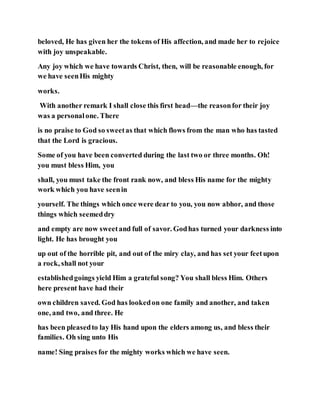
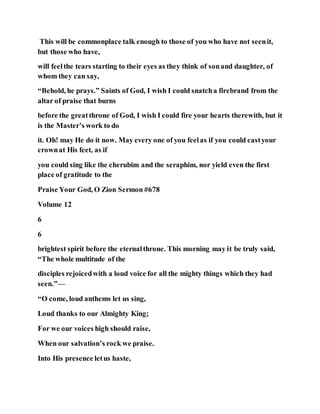
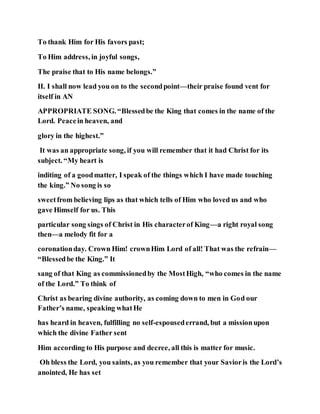
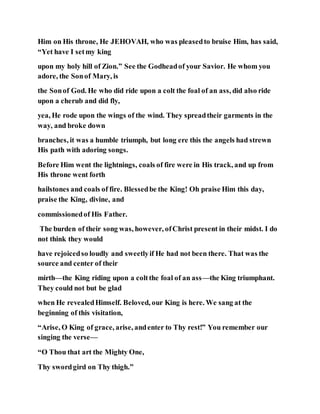
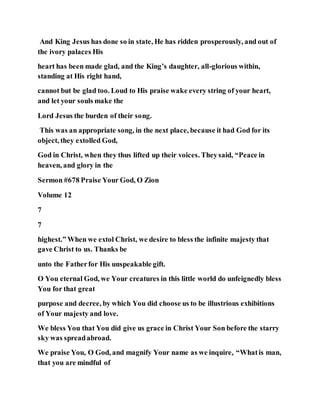
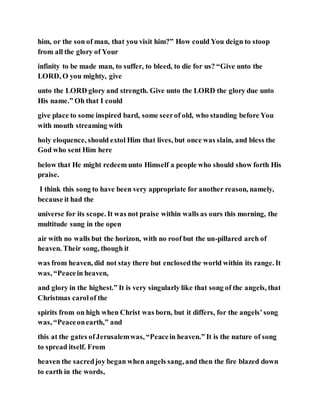
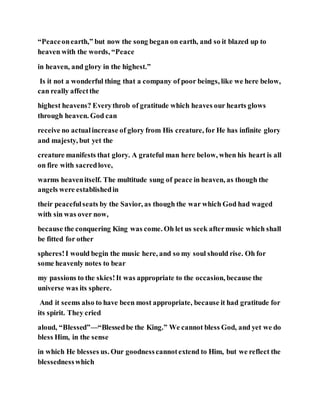
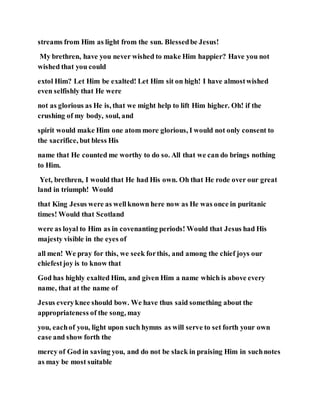
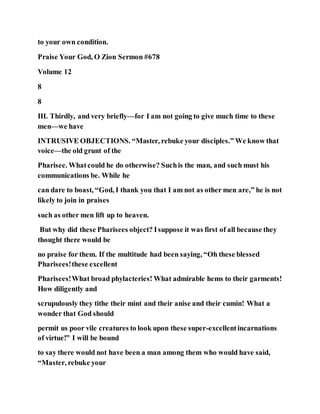
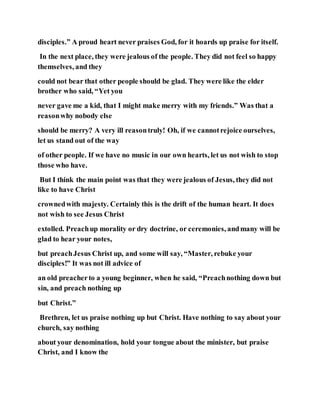
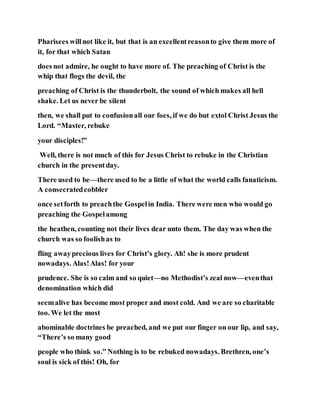
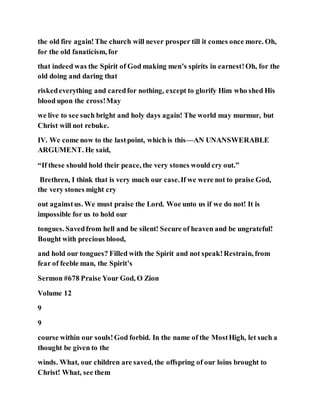
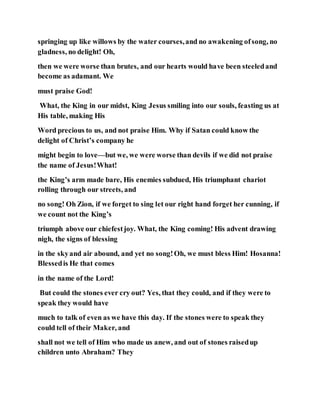
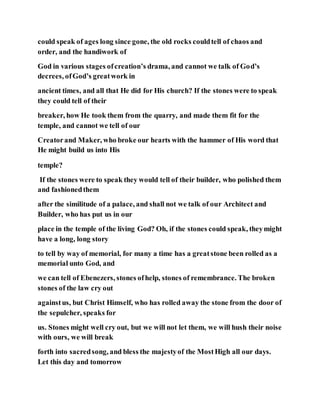
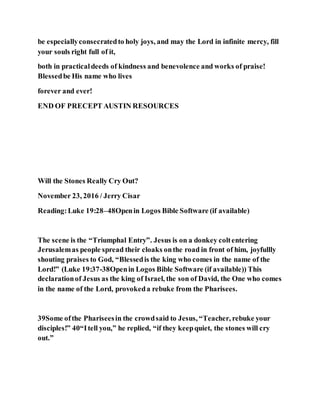
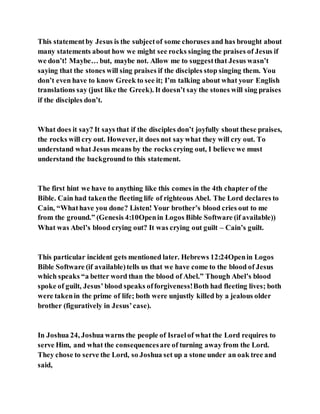
![“See!” he said to all the people. “This stone will be a witness againstus. It has
heard all the words the LORD has saidto us. It will be a witness againstyou if
you are untrue to your God.” (Jos 24:27Openin Logos Bible Software (if
available))
The stone had been present when all the warnings were issued by Joshua;the
stone heard the people’s commitment to serve the Lord. In the event that the
people failed to keepthe covenantthey couldn’t deny that they had made the
commitment for the stone was present. Therefore the stone could serve as a
witness in a court case againstthe people if they failed to keepthe covenant.
In Habakkuk 2:9-11Openin Logos Bible Software (if available)we read of the
stones of a wall crying out againstthose who had, in their presence, made and
plotted their greedyplans. Once again the stones hear and testify againstthose
who did wrong in their presence. Of course, this all seems to be a figurative
way of saying, “you will be brought to accountfor what you have done… and
will not be able to deny it. These stones willserve as witnessesagainstyou.”
When we arrive in Luke 19:40Openin Logos Bible Software (if available)I
believe it is best to read this backgroundinto the statement Jesus makes.In
other words, “If after seeing all these miracles and deeds I have done, no one
shouts out praises and honors me as the MessianicKing, your judgment is
sure and the stones [possibly the stones of the temple where Jesus did some
teaching], will cry out in judgment againstthis city!” This makes even more
sense as we read what immediately follows (Luke 19:41-44Openin Logos
Bible Software (if available)where stones are mentioned again). (See also
Luke 21:6Open in Logos Bible Software (if available).)](https://image.slidesharecdn.com/jesuswasexaggeratingtomakeapoint-200812150152/85/Jesus-was-exaggerating-to-make-a-point-139-320.jpg)
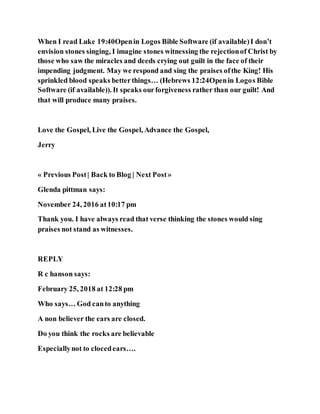
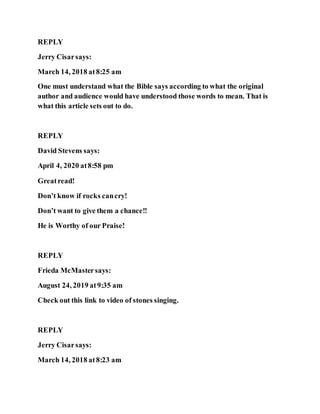
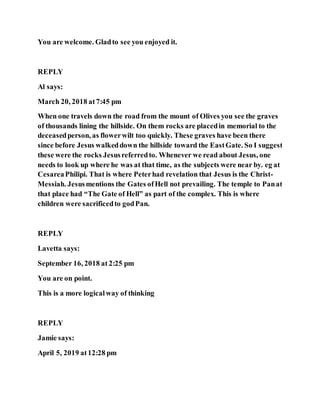
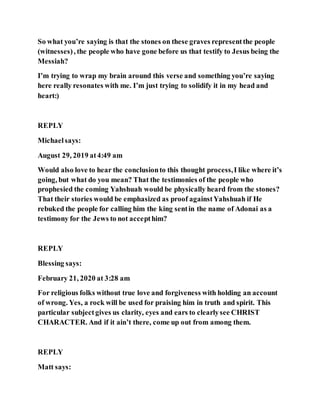
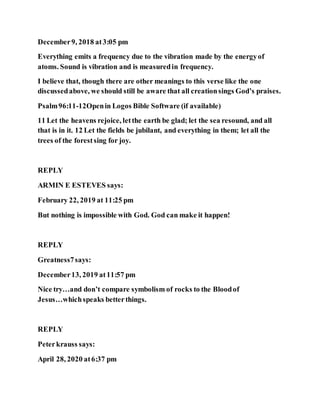
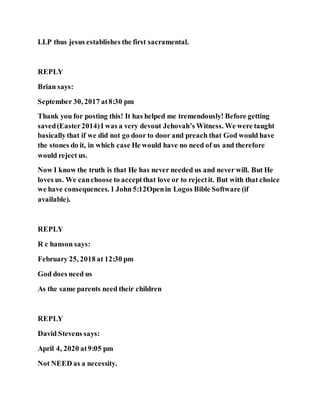

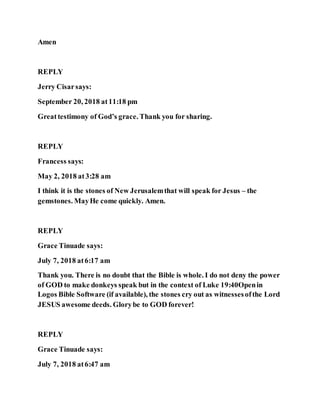
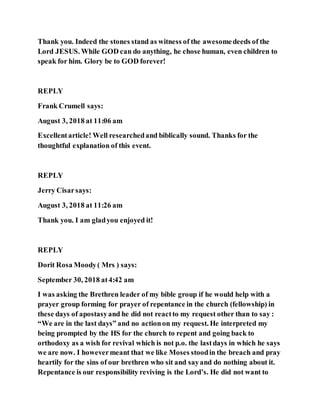
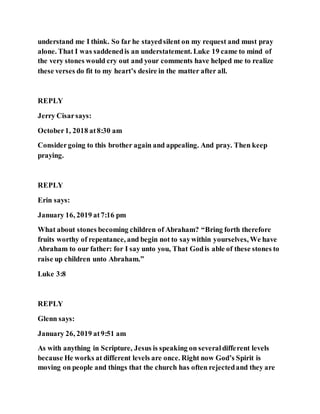
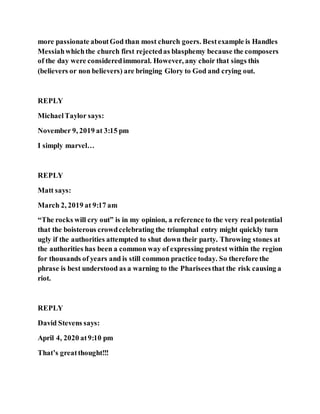
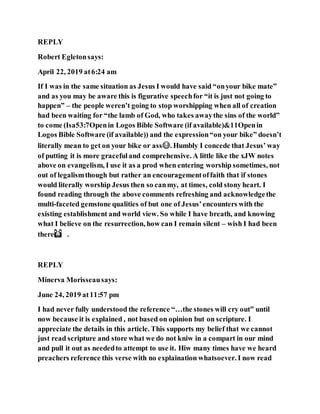
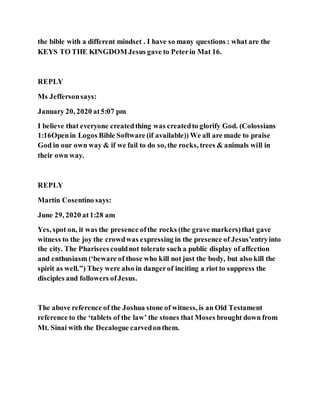
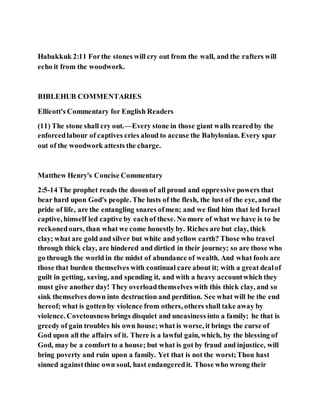
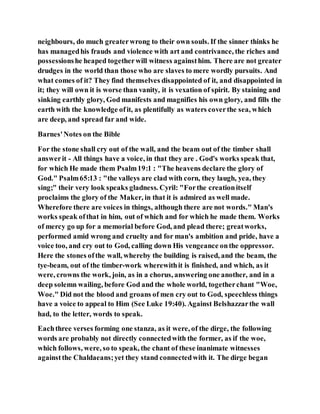
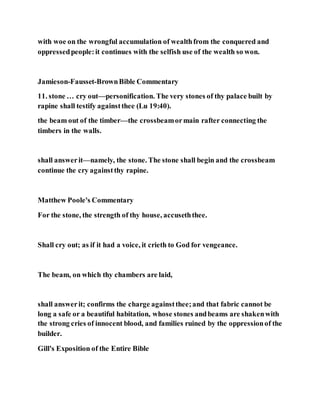
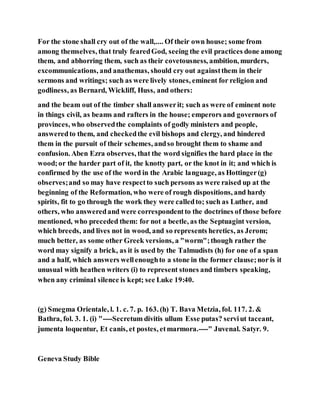
![For the {i} stone shall cry out of the wall, and the beam out of the timber shall
answerit.
(i) The stones of the house will cry, and say that they are built from blood, and
the woodwill answerand say the same of itself.
EXEGETICAL(ORIGINAL LANGUAGES)
Cambridge Bible for Schools andColleges
11. stone shall cry out of the wall] For the stone out of the wall shall cry out.
The Chaldeangains evil gains to build his nest on high; the materials he uses,
the stones and wood, shall cry out againstthe wrong and oppression
perpetrated in procuring them. This sense is preferable to that assumedby
Hitzig, that in his constructions the Chaldeankept back the hire of the
labourers (Jeremiah 22:13).
beam … answerit] i.e. reecho its cry of injustice.
Pulpit Commentary
Verse 11. - Even inanimate things shall raise their voice to denounce the
Chaldeans'wickedness. The stone shall cry out of the wall. A proverbial
expressionto denote the horror with which their cruelty and oppressionwere
regarded;it is particularly appropriate here, as these crimes had been
perpetrated in connectionwith the buildings in which they prided them.
selves, and which were raised by the enforcedlabour of miserable captives
and adorned with the fruits of fraud and pillage. Compare another
application of the expressionin Luke 19:40. Jerome quotes Cicero, 'Orat. pro
Marcello,' 10, "Parietes,medius fidius, ut mihi videntur, hujus curiae tibi
gratias agere gestiunt, quod brevi tempore futura sit ilia auctoritas in his
majorum suorum et suis sedibus" (comp. Eurip., 'Hippol.,' 418, Τέρεμνά τ
οἴκωνμή ποτε φθογγὴνἀφῇ:Ovid, 'Metam.,'2:696, "Tutus eas:lapis iste
prius tua furta loquetur"). Wordsworth sees a literal fulfilment of these words
in the appalling circumstance at Belshazzar's feast, whena hand wrote on the](https://image.slidesharecdn.com/jesuswasexaggeratingtomakeapoint-200812150152/85/Jesus-was-exaggerating-to-make-a-point-157-320.jpg)
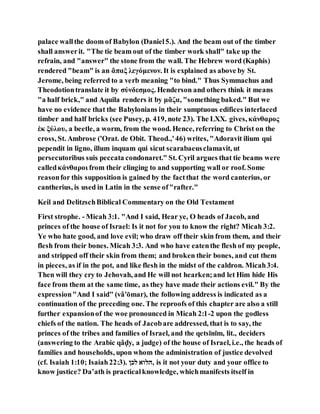
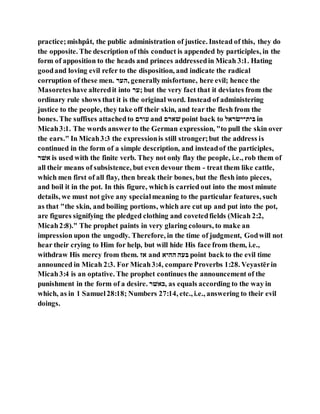
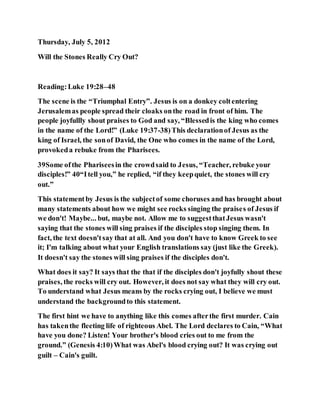
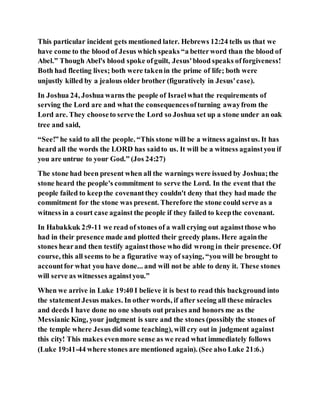
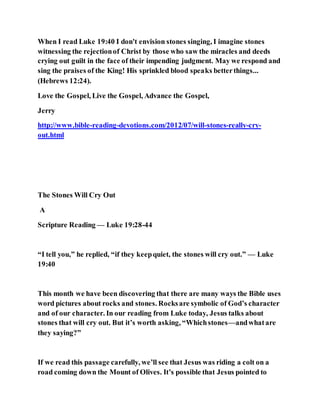
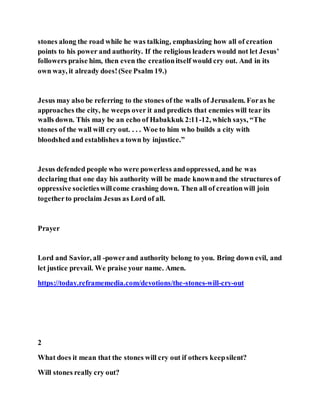
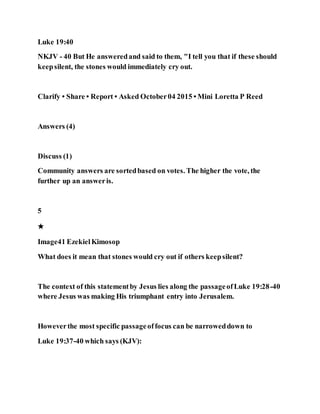
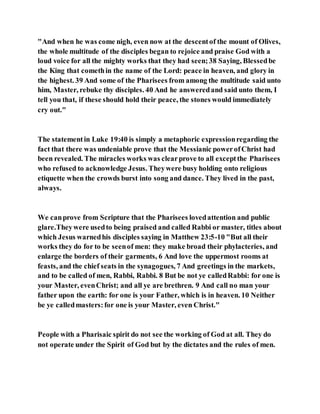
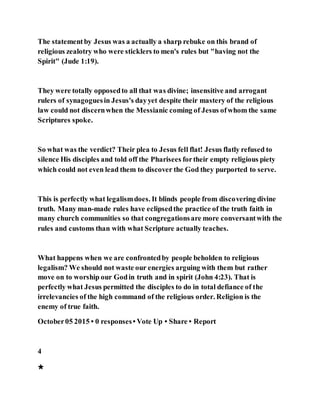
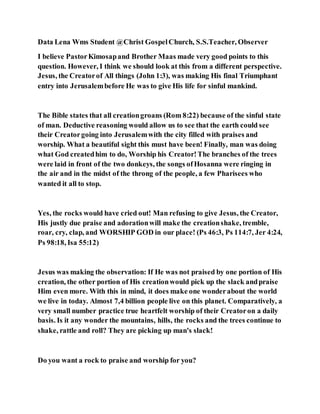
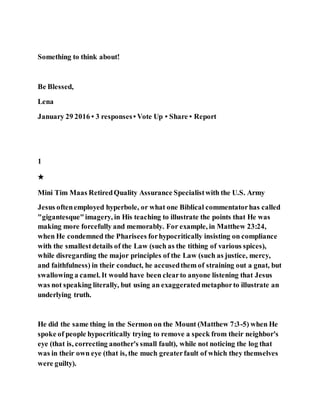
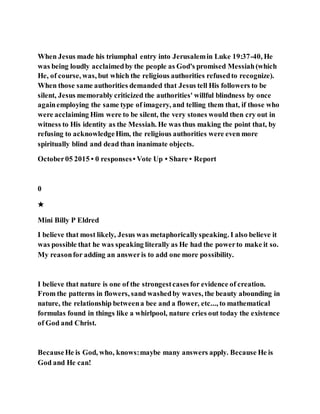
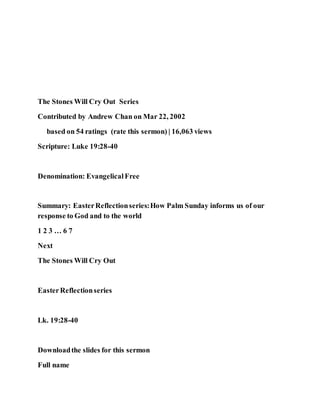
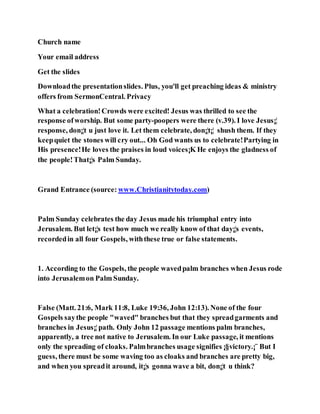
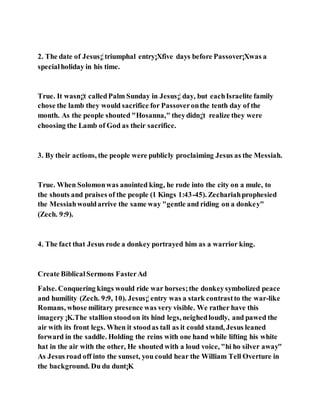
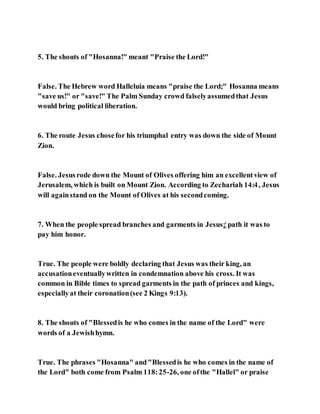
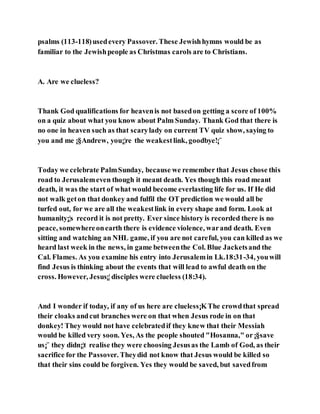
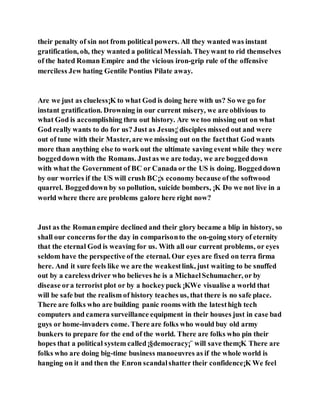
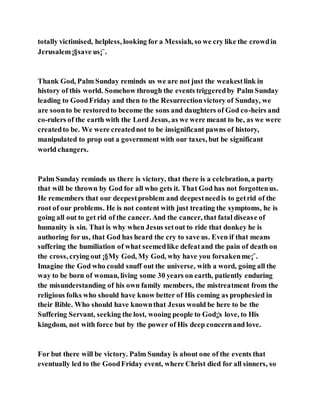
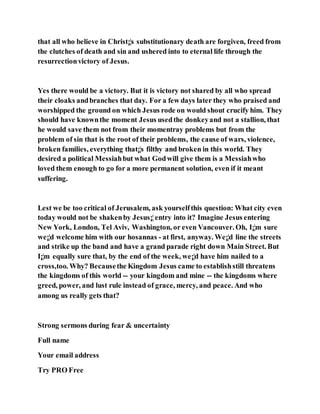
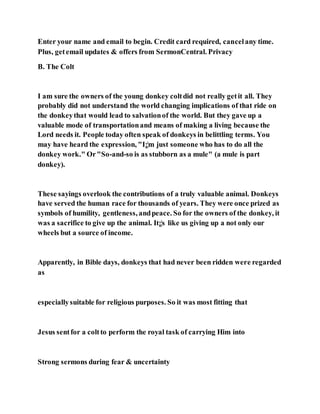

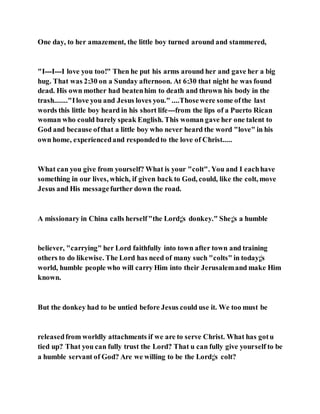
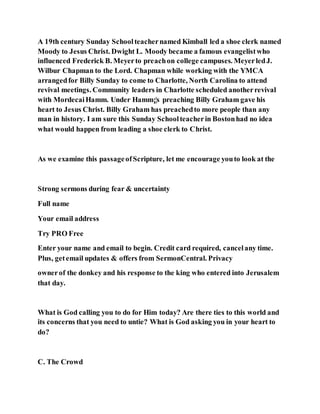
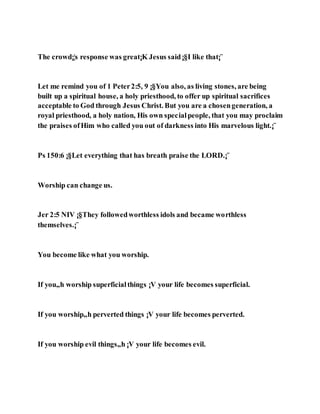
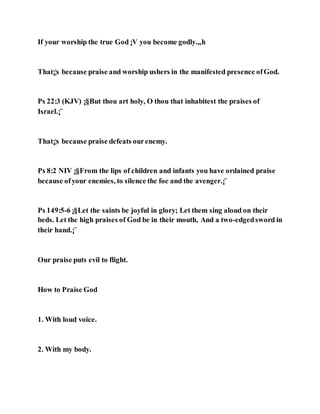
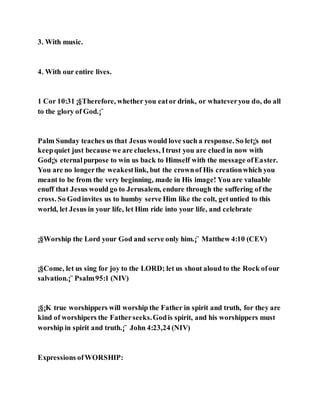
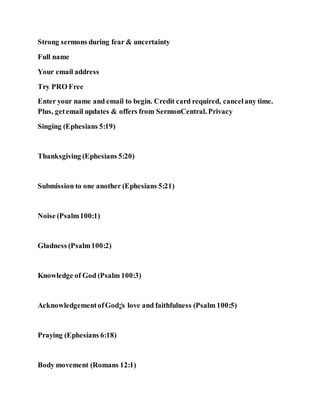

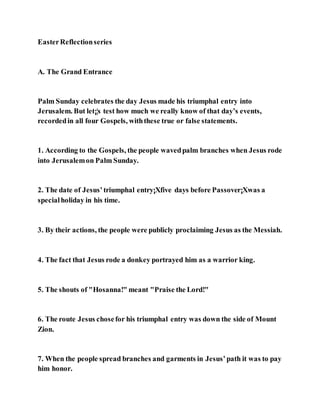
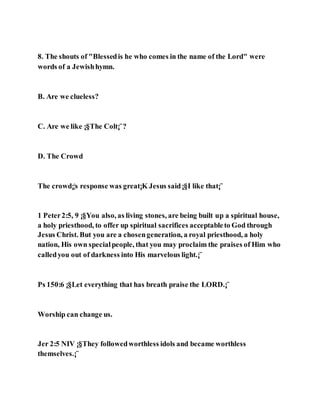
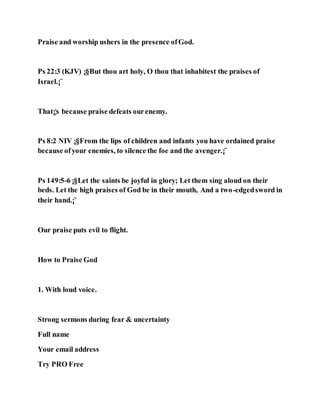
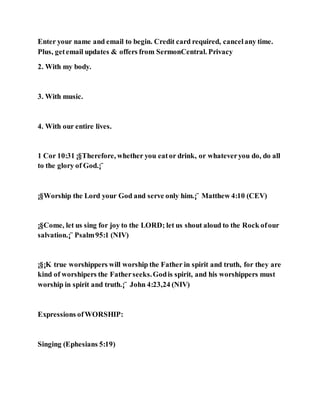
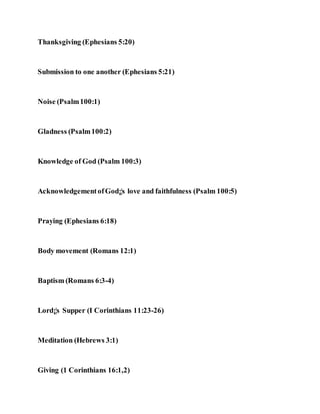
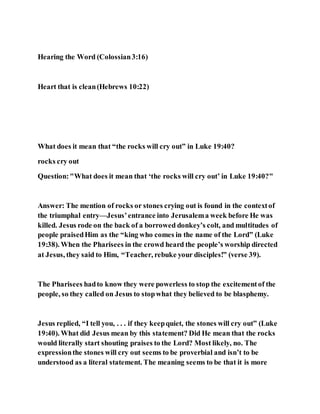
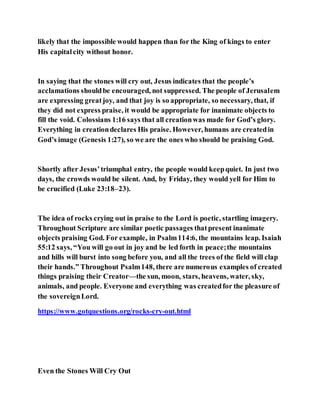
![By BBC | March 25, 2013 | Comments Offon Even the Stones Will Cry Out
Pastors MaryScheerand Patti Ricotta team up to fill in for PastorDoug.
As PastorPatti and I are sharing this message, we will be using the scripture
PastorDoug had planned on using today. When we realized on Friday that we
would be preaching, we decided to split the scripture passage. I will be
sharing the first part of the scripture from Luke 19:28-34.
March 24, 2013
Luke 19: 28-40, EvenThe RocksWill Cry Out
PastorMary Scheerand PastorPatti Ricotta, BrewsterBaptistChurch
[vimeo 62611551w=500&h=375]
Audio Player
00:00
00:00
Use Up/Down Arrow keys to increase ordecrease volume.
Podcast:Play in new window | Download(Duration: 24:53 — 22.8MB)](https://image.slidesharecdn.com/jesuswasexaggeratingtomakeapoint-200812150152/85/Jesus-was-exaggerating-to-make-a-point-194-320.jpg)
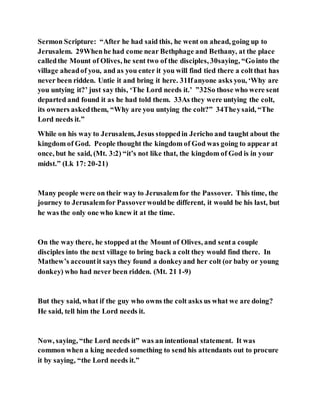
![There was an ancientcustom called“angaria” whichallowedfigures of state
and persons of note to impress property into personaluse. This is a right that
extended to Rabbis[1], which was also a waythat people saw Jesus.
Additionally, this would have helped identified Jesus as king of the kingdom
he has been preaching and teaching about.
Do you think the disciples were amazed when they just barely entered the next
town and found a colt tied up just where Jesus saidit would be?
And they were untying it when, just as they thought would happen, the owner
came out of his house and said, what are you guys doing taking my colt? And
they said, “the Lord needs it.” And he let them have it.
While the passagedescribes people praising Jesus as King.
This fulfills scripture from Zechariah9:9 (& Isaiah 7:14), which says,
“Rejoicegreatly, DaughterZion! Shout, Daughter Jerusalem! See, your king
comes to you, righteous and victorious, lowly and riding on a donkey, on a
colt, the foal of a donkey.”
I think it’s interesting that tradition holds that just before Jesus was born, his
mother rode on a donkey into Bethlehemwhere she and Josephwere going for
the census. And now a few days before Jesus would die, he road on a donkey
into Jerusalem.](https://image.slidesharecdn.com/jesuswasexaggeratingtomakeapoint-200812150152/85/Jesus-was-exaggerating-to-make-a-point-196-320.jpg)
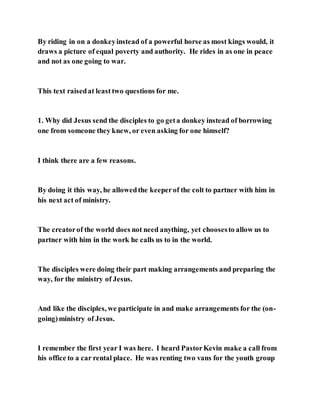
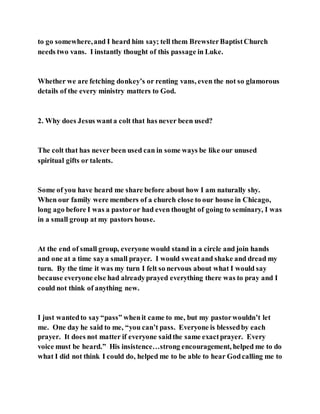
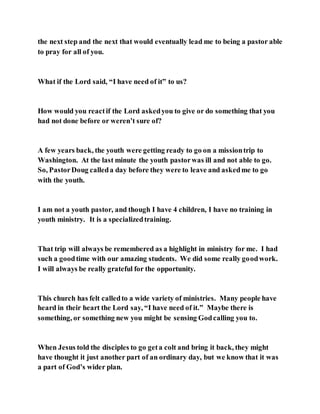
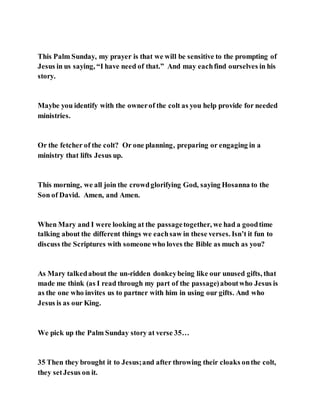
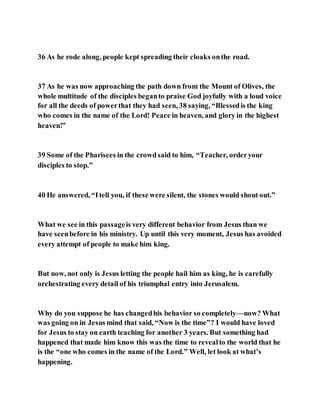
![In vs. 35 his disciples make a soft saddle out of their cloaks, and the verse says
“they set Jesus onit.” In Luke’s story, Jesus doesn’tjust climb on the donkey;
his disciples sethim on it. They must have lifted him up the way a royal
footmen would lift a king or a squire would lift a knight and place him on his
trusty steed.
As he rode along, people spread out their cloaks. Othergospels saythey threw
branches on the ground. This was an ancient wayof showing respectand
honor to a king or dignitary. Fredrick Beuchner calledit “a poor man’s red
carpettreatment.[2]”
By the time he got to the path leading down from the Mount of Olives the
whole multitude of disciples were praising God…joyfully…with a loud voice
for all the deeds of powerthat they had seenJesus do.
By now Jesus had many “disciples.”These are not just people on the street.
Luke alone makes the point that the crowd included a multitude of disciples.
I think this is one of the important clues as to why Jesus chosethis time to
revealhimself as king.
Have you ever read “The Tipping Point” By MalcolmGladwell? In this book,
Gladwellwrites about what he calls “a magic moment when an idea, trend, or
socialbehavior crosses a threshold, tips, and spreads like wildfire.”[3]](https://image.slidesharecdn.com/jesuswasexaggeratingtomakeapoint-200812150152/85/Jesus-was-exaggerating-to-make-a-point-202-320.jpg)
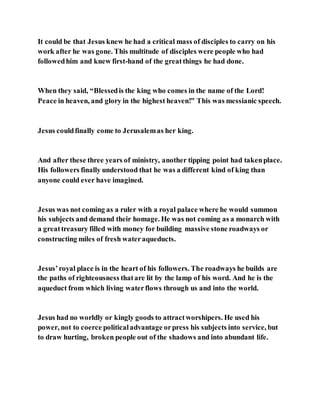
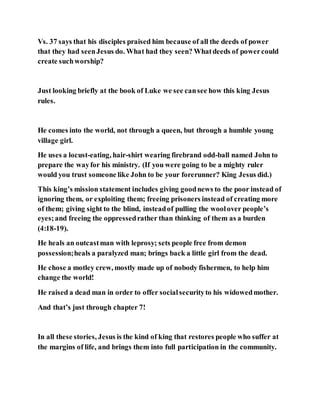
![He responds to his followers from his heart of love, and self-giving—and
ultimately, self-sacrifice.That’s what he offers and that’s what compelleda
whole multitude of the disciples to praise God joyfully with a loud voice.
There were now enough people who knew what kind of king Jesus really was.
Jesus knew that his kingdom would prevail even after he was gone.
In our last two verses, the crowd was atthe height of joy and gratitude. But
that was just too much for the religious elite who are threatened by this kind
of king who would expose their hypocrisy. Furiously, 39 “Some of the
Pharisees in the crowd said to Jesus, ‘Teacher, orderyour disciples to stop.’
40 He answered, ‘I tell you, if these were silent, the stones would shout out.’”
“The stones would shout out…” The fullness of the knowledge ofthe Lord and
of the kind of king Jesus was had so filled the earth that nothing could stop
the praise that was due him!
The tipping point had been reachedso that even the lifeless world recognized
life when it saw it. All of creationwas aware of Jesus’Lordship, exceptthe
leadership of the nation.[4]
It’s no wonder the disciples praisedGod with joy and the rocks were ready to
cry out. Let me ask you this: Do we recognize the kind of King Jesus reallyis?
Have you made this king your lord and Savior?
Let’s pray.](https://image.slidesharecdn.com/jesuswasexaggeratingtomakeapoint-200812150152/85/Jesus-was-exaggerating-to-make-a-point-205-320.jpg)
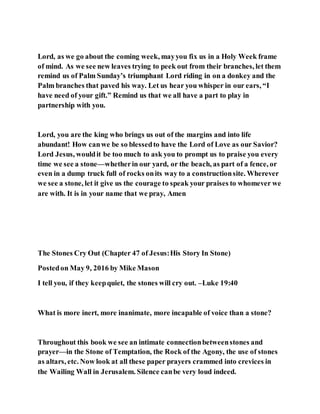
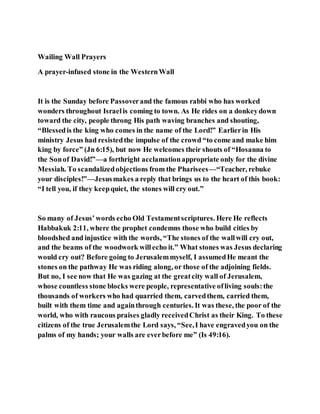
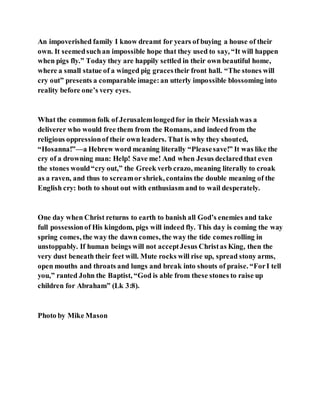
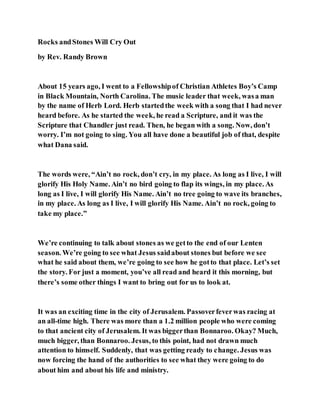
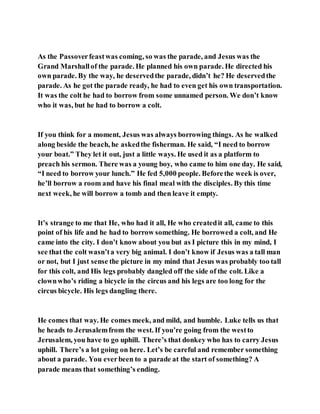
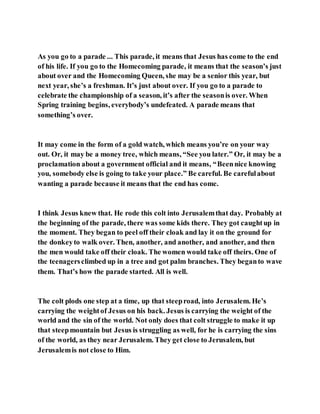
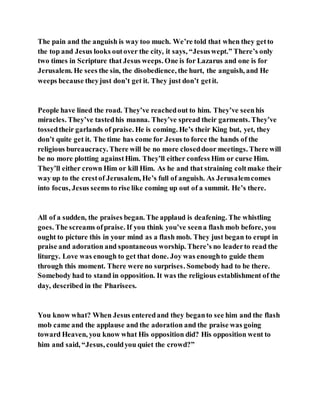
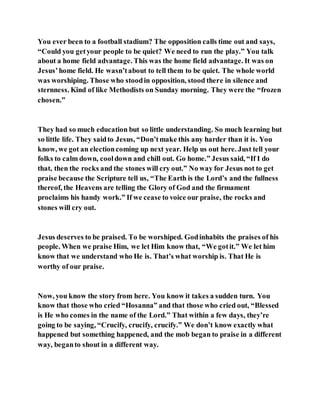

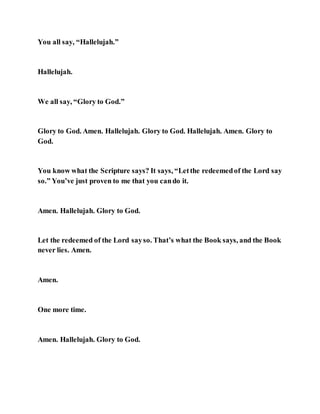
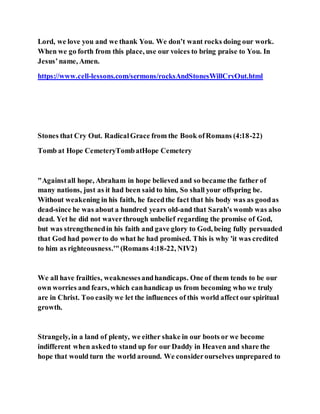
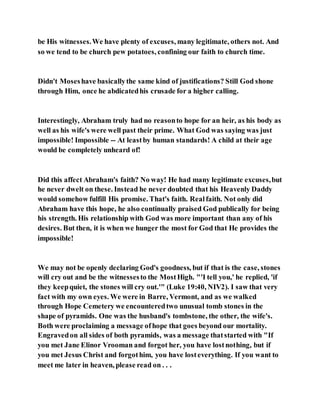
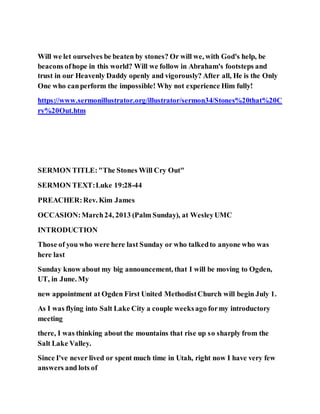
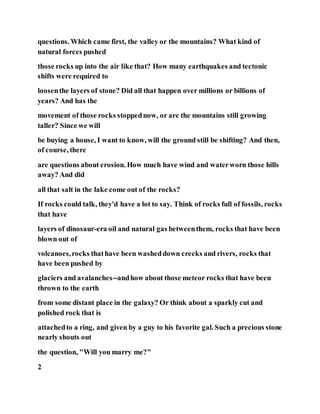
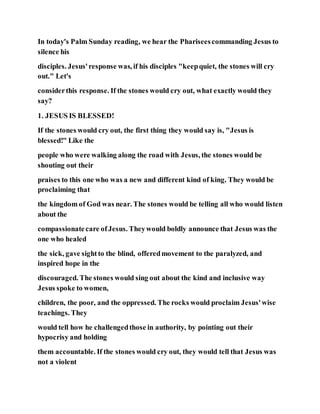
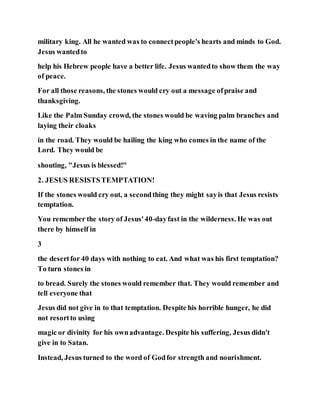
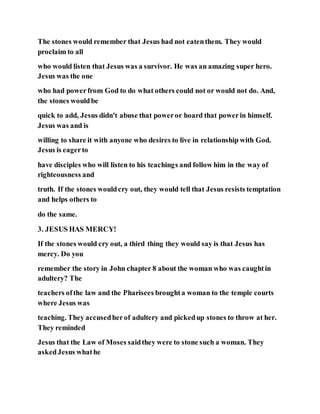
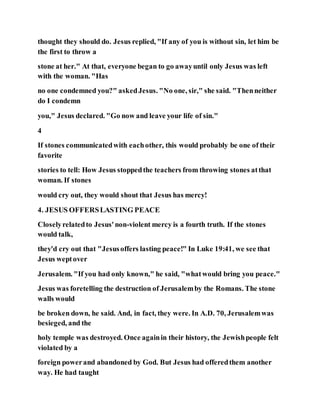
![them to turn the other cheek. He had taught them that, if a Romandemanded
them to carry a
load one mile, they should carry it two. Jesus had taught them, Blessedare the
meek. Jesus had
taught them to forgive overand over again.
I'm not sure how he knew, but somehow Jesus figuredout that lasting peace
doesn't come
through building stone walls. Stones canalways fall or be knockeddown.
Only through
following Jesus'non-violent teachings canwe get the result of lasting peace.
CONCLUSION
In 2006, a Leonardo DiCaprio movie came out calledBlood Diamond. I've
never had a
chance to see it, but I read about it. "Setduring the Sierra Leone Civil War in
1996-2001, the
film [portrayed] a country torn apart by the struggle betweengovernment
soldiers and rebel
forces." The film depicted "many of the atrocities" rebels perpetratedin
order "to discourage
[people] from voting in upcoming elections."1
5
The film also educatedthe public about the use of diamonds, "mined in a war
zone and
sold to finance an insurgency, [or] invading army's war efforts." This use of
blood diamonds--](https://image.slidesharecdn.com/jesuswasexaggeratingtomakeapoint-200812150152/85/Jesus-was-exaggerating-to-make-a-point-224-320.jpg)
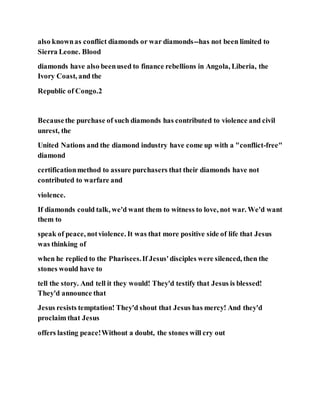
!["I tell you that if these [people] should keepsilent, the stones would
immediately cry out."
These words, proceeding from the very lips of our Lord Jesus Christin Luke
19:40 tell us just how worthy He is to be praised.
His words paint so much more than stones with opened mouths shouting His
praise; it shows our wonderful privilege as His people createdin His image
and likeness.
But why did He saythese words? What canwe learn from them? Let's talk
about that.
The day we stop praising Him
Jesus saidthese words as a response to some critics who envied Him. Let's
read the passage:
"Then, as He was now drawing near the descentof the Mount of Olives, the
whole multitude of the disciples beganto rejoice and praise God with a loud
voice for all the mighty works they had seen, saying:
" 'Blessedis the King who comes in the name of the Lord!' Peacein heaven
and glory in the highest!"](https://image.slidesharecdn.com/jesuswasexaggeratingtomakeapoint-200812150152/85/Jesus-was-exaggerating-to-make-a-point-226-320.jpg)
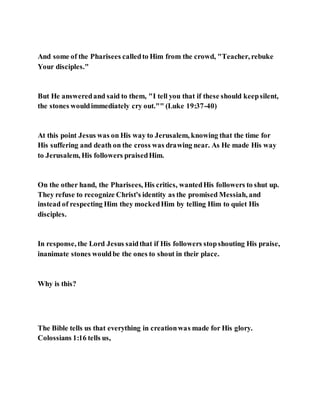

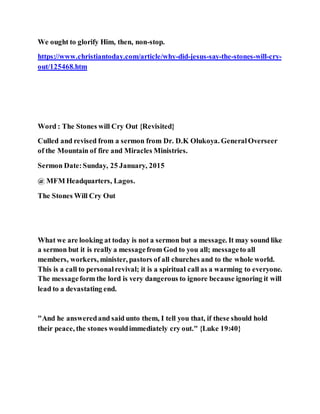
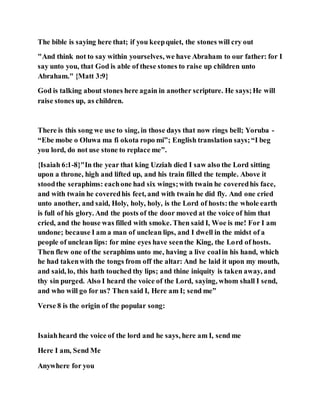
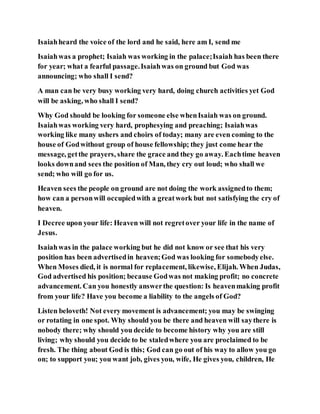
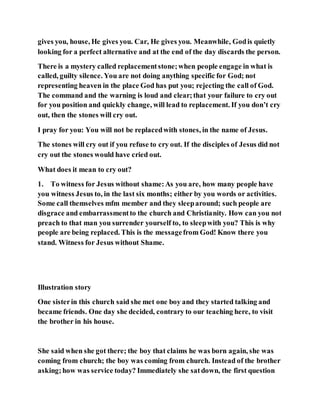
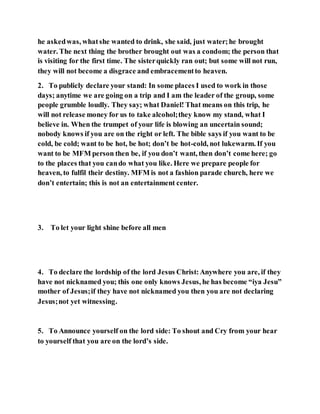
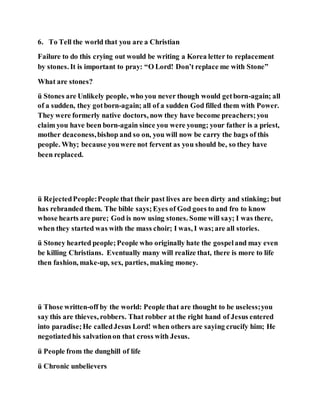
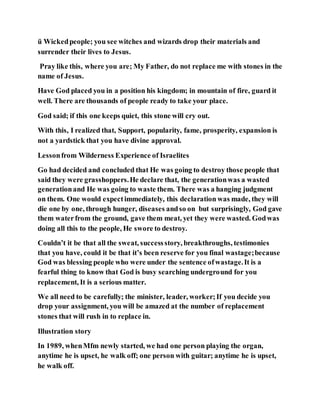
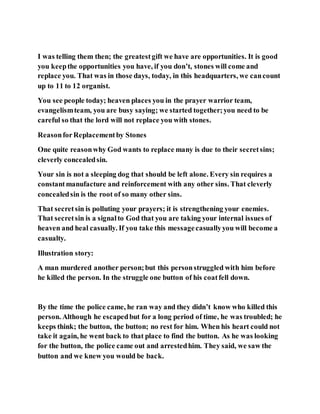
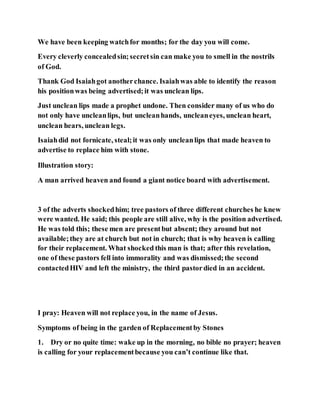
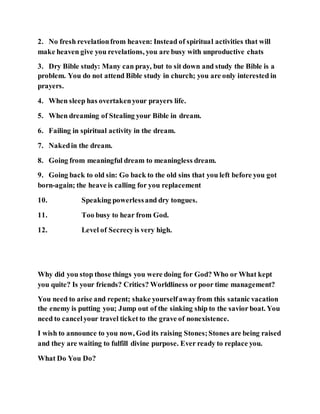
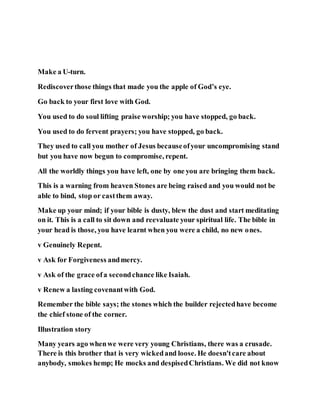
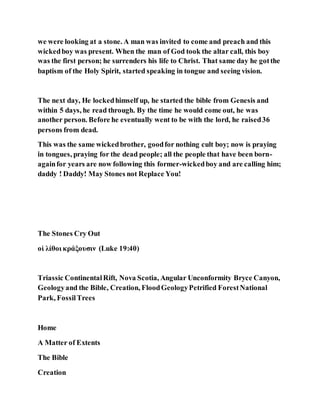
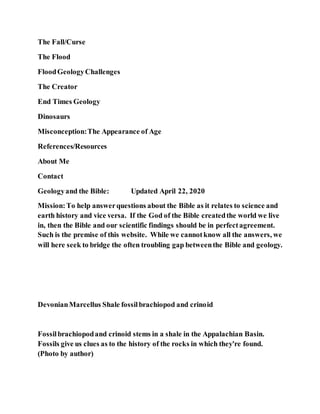
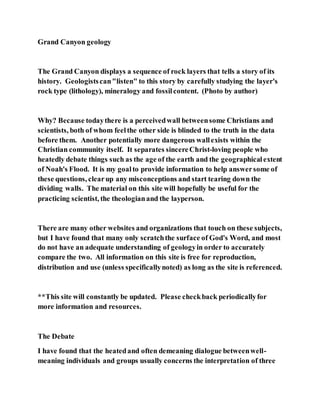
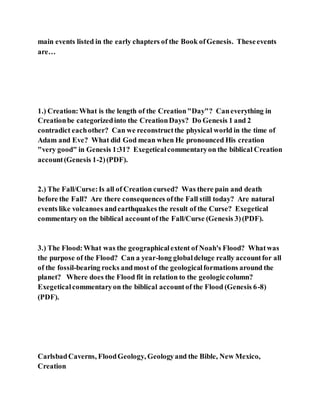
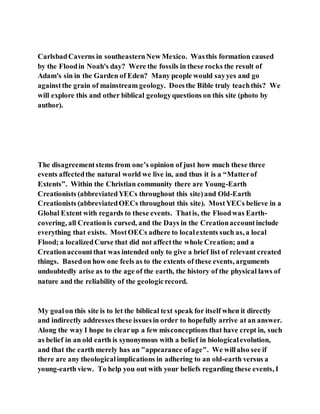
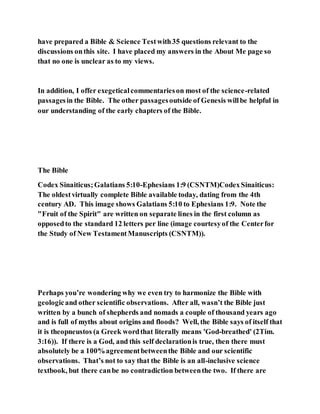
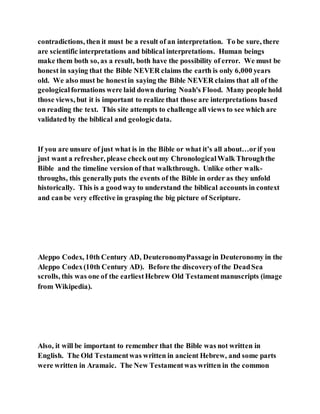
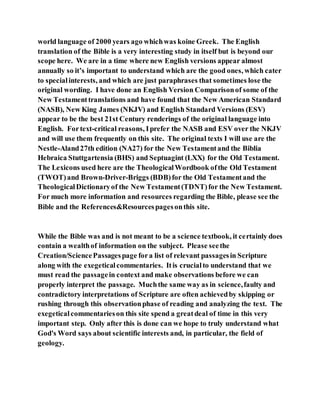
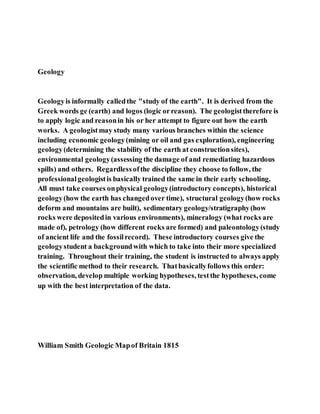

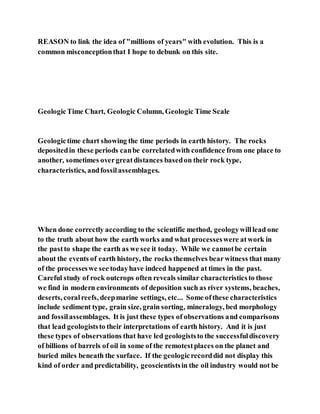
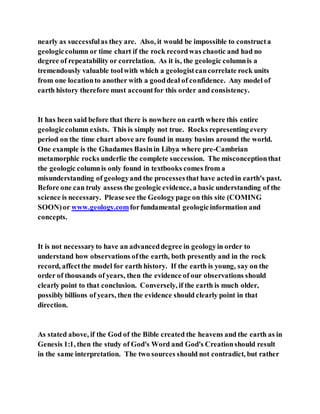
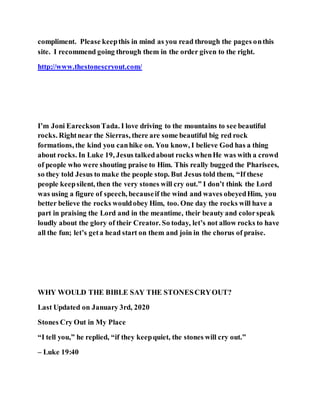
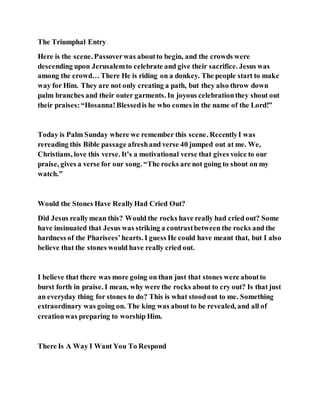
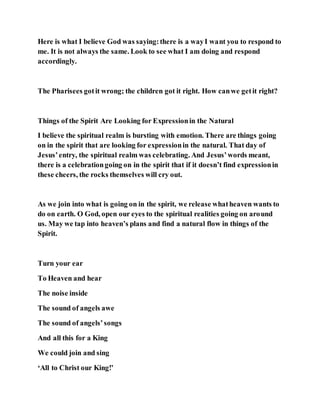
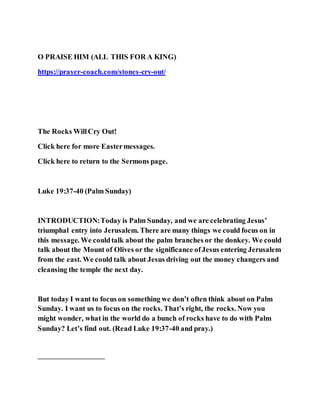
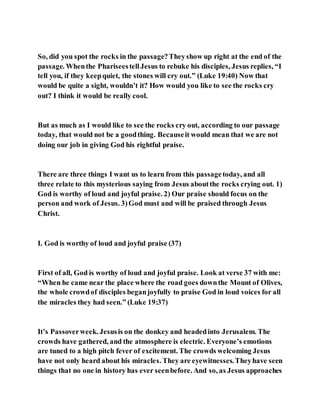
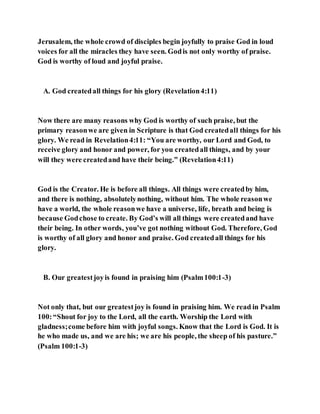
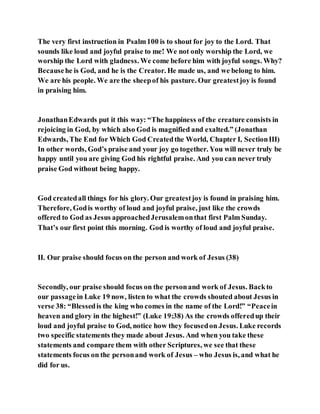
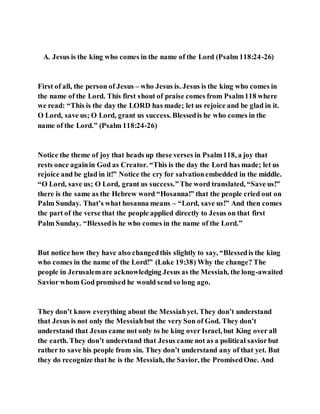
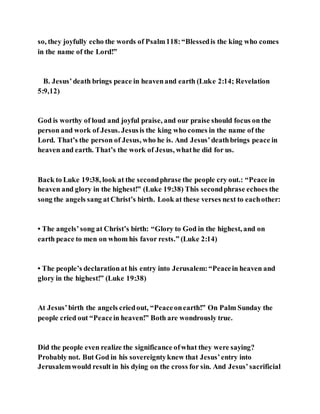
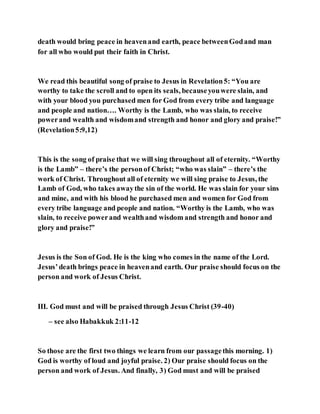
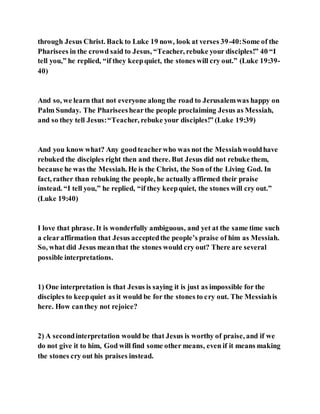
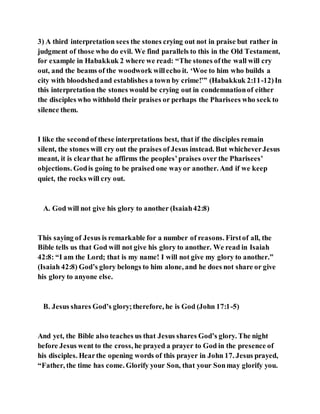
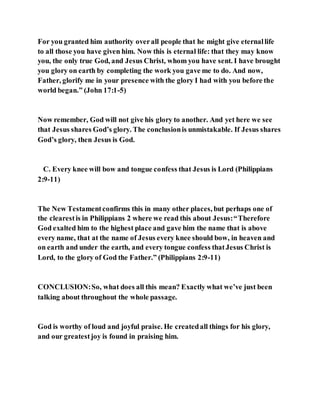
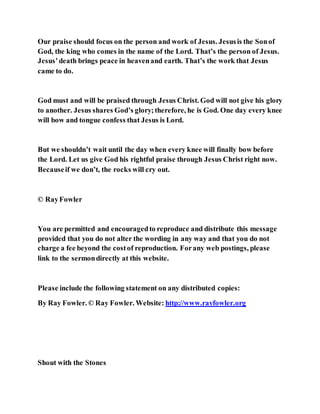
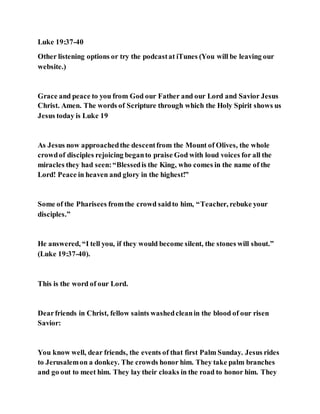
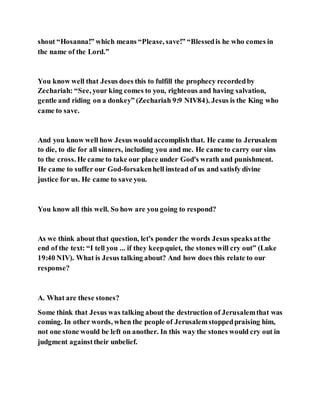
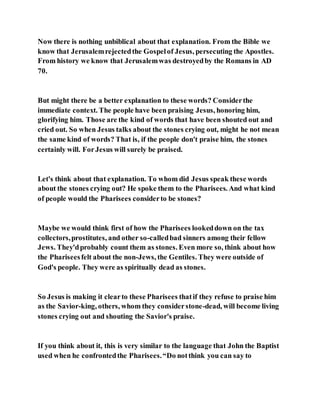
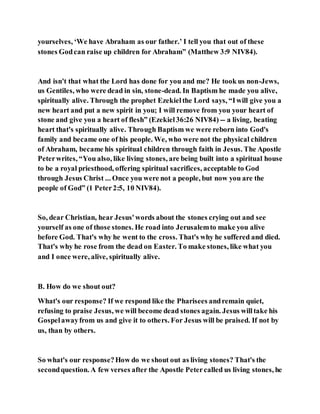
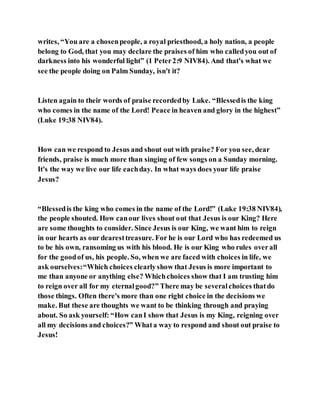
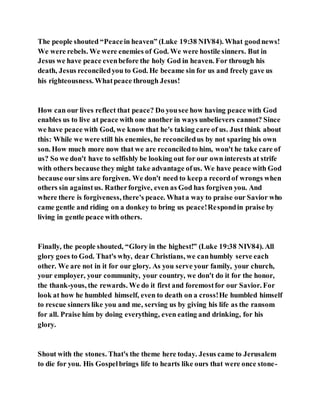
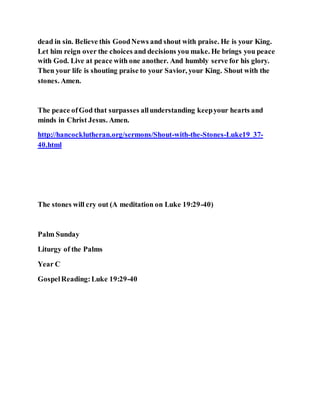
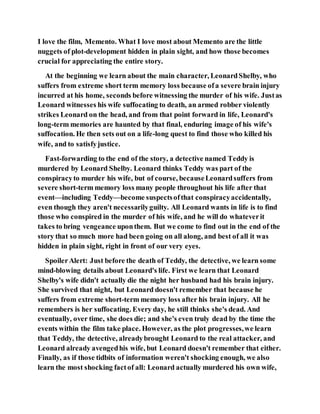
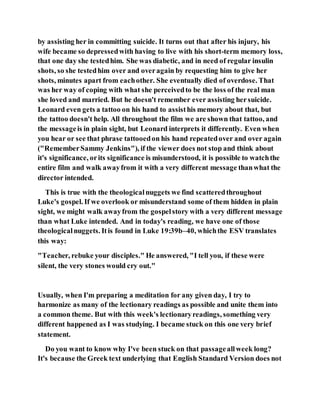
![say that. And I've been hung up all week onwhat it actually says, and why
Jesus saidthat. What the Greek text actually says is this:
"Teacher, rebuke your disciples!" And answering, He [Jesus]said: "I say to
you-all, that when these [disciples]become silent, the stones will cry out!"1
As I perused through my biblical commentaries, I noticed that this passage is
usually explained in one of two ways. It's either explained as a comparison
betweenanimate human beings (i.e. disciples)and inanimate objects (i.e.
stones), illustrating somehow, some way, that Jesus deservesto be praisedby
His creation, e.g. "Ifpeople stop praising Jesus, surelythese stones on the
ground will instead!", or it's expressing a contrastof faith betweenthe
Pharisees andstones, illustrating that even stones understand their Creator
better than Pharisees.2
With either option, I'm left unconvinced. And I think it's important to
convince others to remain unconvinced as well. But in order to reachany
conviction about the meaning of this theologicalnugget(whetherone agrees
with me or not), it always helps to start by asking obvious questions. For
instance, why does Jesus mention stones? Is it merely because they can be
classifiedas inanimate objects? In that case, wouldn't the reference to stones
be somewhatarbitrary, as though Jesus couldhave mentioned any other static
material on this planet—such as trees, saddlebags, orbelly-button lint—to
illustrate the same point? He just mentioned "stones" forno essentialreason,
I guess. Perhaps it was the first thing that popped into His mind, someone
might say. That sounds like a dubious proposalat best.
What if the whole point of mentioning stones is simply to point out how
lifeless the faith of the Pharisees is? Although I don't doubt that the faith of
many Pharisees was dead, I don't think that clarifies what Jesus actually said.
Again, all one has to do to notice my contentionis to simply look back at the
text. Re-readit a few times. Such explanations about dead pharisaicalfaith
hardly accounts forwhat Jesus actually saidin context. (Besides, if you've
read the previous 18 chapters of Luke's gospel, you should have already](https://image.slidesharecdn.com/jesuswasexaggeratingtomakeapoint-200812150152/85/Jesus-was-exaggerating-to-make-a-point-275-320.jpg)
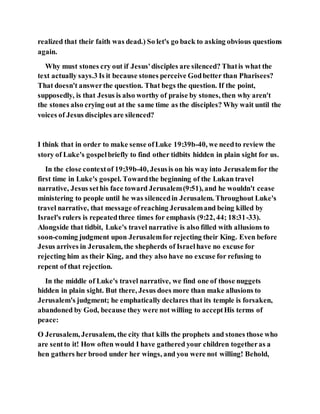
![your house is forsaken. And I tell you, you will not see me until you say,
'Blessedis he who comes in the name of the Lord!'" (Luke 13:34-35)
Now fast forward to the end of Luke's travel narrative, where Jesus is about
to leave Jericho and enter into Jerusalemfor the first time. There we find
Jesus telling one last parable to his disciples en route to his triumphal entry
(19:11-27). In that parable Luke goes out of his way to emphasize the
allegoricalrelationshipbetweenJesus'servants in Jerusalemand Himself
entering that city as their King. By the end of the parable the "wicked
servants" and "enemies" have proven themselves hostile and indignant
toward their King. Notonly had they perpetuated gross injustice while the
King was away(similar to the claim above about "killing the prophets and
stoning those who are sent to it"), they also would not repent or acceptHis
terms of peace and reconciliation. Theyrefused to let Jesus rule mercifully
over their merciless kingdom. For that reason, the King decrees thatthey be
slain upon his arrival. With the merciful, he would show himself merciful.
With the blameless, he would show himself blameless. And with the crooked,
he would make himself seemtorturous (Psa. 18:25-26;2 Sam. 22:26-28). Jesus
saves those who are humble, but his eyes are on the haughty to bring them
down.
After that final parable, Jesus follows his prophetic cry with more sovereign
lamentations explicitly directed at first century Jews in Jerusalem(Luke
19:41–44):
And when he [Jesus]drew near and saw the city [Jerusalem], he wept over it,
saying, "Would that you, even you [Jerusalem], had knownon this day the
things that make for peace!But now they are hidden from your eyes. For the
days will come upon you, when your enemies will set up a barricade around
you and surround you and hem you in on every side and tear you down to the
ground, you and your children within you. And they will not leave one stone
upon another in you, because youdid not know the time of your visitation."
Much like the prophet Habakkuk's reasons forthundering woes against
Jerusalem, it is this incessantrejectionof Israel's King by their rulers which](https://image.slidesharecdn.com/jesuswasexaggeratingtomakeapoint-200812150152/85/Jesus-was-exaggerating-to-make-a-point-277-320.jpg)
![leads to the toppled stones ofthe Temple's ruin crying out againstthose
perpetrating violence and injustice within:
You have devised shame for your house by cutting off many peoples!You
have forsakenyour life! The stone shall cry out from the wall, and the beam
from the woodwork respond:"Woe to him who builds a town with blood and
founds a city on iniquity!" (Habakkuk 2:10-12)
I believe these nuggets of prophetic woes scatteredthroughout Luke's gospel
are designedto clarify what Jesus saidto Pharisees during his triumphal
entry. The "Wisdomof God" repeatedlytold Jerusalemthat His prophets and
apostles wouldbe sent to them, but they would not listen. Instead, the harlot-
city would silence the Lord and His servants (Luke 11:49–52). With that
trajectorytoward rejectionand judgement, when we reach the point of Jesus'
triumphal entry into Jerusalem, and we see the Pharisees stillattempting to
silence Jesus'disciples (19:39b), Jesus'response makesperfectsense if its
understood as a prophetic, Habakkuk-like cry toward Jerusalemand its
corrupt rulers. As Jesus'disciples cry out, "blessedis the King who comes in
the name of the Lord! Peace inheaven and glory in the highest!", the
Pharisees tellJesus to rebuke the disciples. So when Jesus responds to the
Pharisees,its trajectory is directed toward the harlot-city, towardJerusalem's
rejectionand consequentjudgment:
"I say to you-all, that when these [disciples]become silent, the stones will cry
out!"
Little did the Pharisees know that the prophets, apostles, and disciples of
Jesus were living stones ofGod's new temple-building project(Eph. 2:19-22;1
Pet. 2:4-6), so when those stones cry out for vindication, judgement is right
around the corner because their voices are heard by Jesus himself in his
heavenly temple. This was the Lord's mysterious and marvelous plan all
along. It is through the incarnation, death, resurrection, and ascensionof
God's incarnate Son that the blood of all the prophets and apostles, shedfrom
the foundation of the world, would cry out and finally receive vindication for
all their suffering. They witnessed to the truth of God and His reign over all,](https://image.slidesharecdn.com/jesuswasexaggeratingtomakeapoint-200812150152/85/Jesus-was-exaggerating-to-make-a-point-278-320.jpg)
